Writing the Personal Statement for Pharmacy School: A 5 Step Checklist
You’ve likely written a personal statement at some point in your life. Perhaps while applying to your undergraduate program, some of your schools required you to include an essay describing your achievements, yourself, and what you hope to accomplish in your time at their university. Similarly, many pharmacy programs will require you to write a personal statement for their application.
This, however, is different. You will be able to highlight your relevant accomplishments and address why you want to become a pharmacist to stand out truly . With so many applicants during each cycle, admissions officers use this personal statement to gauge whom they wish to speak with for an in-person interview.
At this phase of the application journey, you've narrowed down the pharmacy schools you’re applying to. Your transcripts are in, letters of recommendation are ready, and it’s time for your pharmacy personal statement. The good news is that, unlike undergraduate applications that sometimes have different prompts, you must answer for various schools; your one pharmacy school personal statement will be sent to every program through your PharmCAS application . That also leaves an exciting challenge: Even if you have a favorite, you must consider how you want to write this personal statement, as it shouldn’t be tailored toward one specific school.

1) Determining the Narrative
When writing a pharmacy school personal statement, the most common pitfall students experience is the need for more effort placed into their writing. While your grades may be exceptional, and your letters of recommendation prove that your student-teacher relationships are healthy and you are a pleasure to have in class, having a generic pharmacy personal statement doesn’t differentiate you from other qualified applicants. If all applicants have already covered the first two things, the personal statement may be the shining piece of the application. For most students, writing this statement will be the most challenging part of the application process.
Begin to formulate your narrative. Lay out the structure and the different sections. There’s no specific format that pharmacy schools are looking for, so make this personal statement unique to yourself. As mentioned, the “cookie cutter” approach to this part of the application is where most students stumble. Use your time wisely and start early . Additionally, you can easily find a sample personal statement on various websites to help structure your thoughts. However, remember that these should be used only as samples and that you shouldn’t rely on them to format your statement.
2)Crafting a Unique Story
Each pharmacy school program wants students who demonstrate tenacity, which will help them succeed in their respective programs. One way to approach writing your pharmacy school personal statement is from the point of view of the admissions committee. Anyone charged with reading thousands of applications will focus on specific questions that signal a level of quality about the rest of the personal statement.
First, what's the reason that this student is choosing pharmacy as their career? Are they doing this for income or a genuine interest in providing the best care for patients? Does the applicant demonstrate a thoughtful understanding of their strengths and weaknesses? Do their ideals align with the mission statement of the school of pharmacy? Each reviewer may concentrate on different questions, but they want to see you feel a personal drive for a career as a pharmacist . Place yourself into the seat of an application reviewer and formulate different questions you could ask students. Try answering these questions and see how genuine your answers are. How you answer may decide if you want to continue to pursue this pharmacy school path.
3) Focus on Your Opening
One universal method many writing courses teach you is always to have a solid opening statement. I'd like you to please use this as an opportunity, to begin with a personal story about why you decided that pharmacy is the right career for you or maybe an inspiring quote that has always resonated with you. The reviewer may have reviewed several applications, so your first few sentences should stand out. You want to be able to make an impression from the beginning while showing an earnest drive to spend a career as a pharmacist.
Once you’ve effectively engaged the reviewer, it’s time for the “meat” of the personal statement. What do pharmacy application committees genuinely want to hear?
4) Getting to Know You
They want to learn more about you before meeting in a live interview. Tell your own story succinctly but without cutting corners. Briefly describe how you learned to overcome obstacles like that to better yourself and those around you. Sure, you can write about your most relevant academic accomplishments. But go beyond that.
Discuss how certain clubs and organizations have helped you progress through your undergraduate experience and how those organizations may have led you to pursue the path of pharmacy school. Highlight the leadership positions you may have held in college that have helped mold you into the leader you see yourself as today. After setting those up, discuss the skills you’ve acquired to help you in pharmacy school and how they’d make you a better pharmacist.
When you mention your relevant academic studies, please keep repeating the pharmacy college admission test (PCAT) scores or the 4.0 GPA you achieved. The committee has this information before them as they read; they don’t need to be reminded.
Talk in detail about your relevant work experiences, such as research or a part-time job in a pharmacy. Discuss how these different work experiences furthered your commitment to the profession. Identify what aspects of the pharmacy setting may have attracted you and what you have learned from these experiences. Some students come into this part of the application process without work experience. That’s okay. You can highlight any volunteer work related to healthcare or pharmacy.
5) Close with Confidence
Finally—and we can’t stress this enough—keep your writing professional. You’re making an impression on a professional committee, and as much as you want to make your statement sound lighthearted, remember that the reviewers’ time is at a premium for reviewing the essays and interviews in the next round.
Be succinct, direct, and human.
Remember to keep our advice top of mind:
The goal of your personal statement is to showcase why you would be the ideal pharmacy student and why your traits/qualities reflect those of a pharmacist.
Be as authentic as possible when detailing why you want to be part of the PharmD program.
GPA and PCAT scores can only get you so far. Your personal statement is a chance for you to stand out in front of the other applicants who apply to the same pharmacy program as you.
Remember, perfecting the personal statement takes time and your admission may depend on how much effort you ultimately put into your writing.
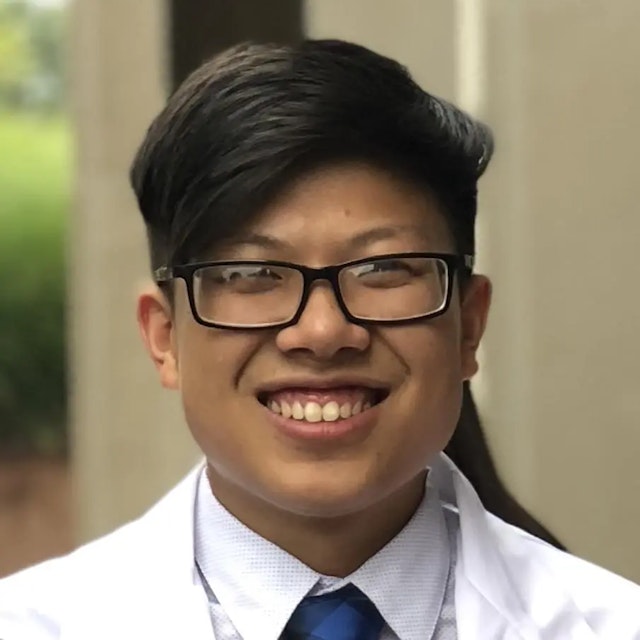
Hong Chen, PharmD
My name is Hong Kui Chen and I am a graduate of The Ohio State University Pharmacy Class of 2022. I am currently working as a clinical research associate at Medpace, Inc, a contract research organization based in Cincinnati, Ohio. My work mainly consists of traveling to various sites around the country and providing protocol training on new clinical trials or monitoring data. While I enjoyed the traditional pharmacy role of working in retail or hospital, I wanted to expand and pursue this non-traditional role to see how clinical trials operate. I have a passion for being able to impact patients in a grand scale and even though I don’t have the 1-on-1 patient interaction, the work that I do can have long lasting contributions to overall patient health.
Opinions and information published by the author here on PharmDDegree.com are of my own and do not necessarily represent the views or opinions of my employer.
Do Not Sell My Info

How to Write a Compelling Pharmacy School Personal Statement
Written by Kelly Tomory
July 12, 2022

If you’re applying to any higher education program, you’re most likely going to run into something called a “personal statement”. Pharmacy school is no exception, and learning how to write a compelling and unique personal statement is a key part in getting accepted to school. Read on to find out how to write one that stands out!
What is a Personal Statement?
A personal statement serves as a way to highlight your skills, interests and experiences. Personal statements tend to be somewhat autobiographical, but it is not just a lengthy personal essay of your entire life story.
Personal statements are also not a regurgitation of all the information you’ve already included in your application and cover letter. Think of your personal statement as more of a narrative, but still keep it informative.
In writing a personal statement, you’re aiming to give the school or program you’re applying for a snapshot of who you are and why you want to be considered for whatever position. They are as much about how you write as what you write. Schools will receive hundreds of personal statements– make sure yours stands out!
What is the Difference Between a Personal Statement and a Cover Letter?
A cover letter generally serves as a means to sell yourself to a company or school. It introduces your resume and all your relevant school and employment history. A personal statement, however, is meant to be more creative and introduce the school to you as a person in an engaging format.
While an application can come off as just a list of what you’ve done, a personal statement frames all your accomplishments in a way that connects your real-life influences with the dates and degrees on your application.
What is the Best Format for a Personal Statement for Pharmacy School?
Think of your personal statement as a narrative essay outlining how you got to where you are today, as well as where you want to go next. Within this story, relate back to pharmaceuticals and medicine and healthcare fields in an organic way. You’ve chosen this path for a reason, what are the steps that got you here?
What Questions Should I Answer in my Personal Statement?
Some helpful questions to aim to answer throughout your personal statement are:
✅ Why do I want to be a Pharmacist?: Think through the times where you have admired pharmaceuticals or where they have most impacted you. Or, think about when you fell in love with medicine and helped people through pharmaceuticals.
✅ What different pharmaceutical paths would I be interested in pursuing?: Are you interested in nuclear pharmacy? What about private pharmaceutical production? If you have a specific niche in mind for a career path, use this space to talk about your interest.
✅ What makes me an excellent and unique candidate for this program?: Have you taken any specialized courses that make you uniquely qualified for this program? Have you had any outstanding internships or positions within the healthcare world?
✅ What are my strengths?: Where do you excel? What specific strengths could you bring to the program and the team you work with? Use this space to highlight your gifts.
✅ Are there any gaps or inadequacies in my application? How can I explain them here?: If you have anything on your application that may confuse someone not familiar with your life circumstances, try to concisely explain it here. Admissions counselors want to be able to give you the best shot possible at being accepted, and sometimes this requires you being up-front about gaps or missing pieces to your work history.
What Should I Avoid in My Personal Statement?
❌ Don’t just repeat what you’ve said in your application. There’s a place for a more sterile, list-based amalgamation of your achievements, but your personal statement is not this place. Admissions staff will learn a lot more about you if you’re creative with your personal statement.
❌ Don’t steal someone else’s work. Plagiarism will disqualify you from admission to pharmacy programs, and it’s also just bad practice for life in general.
❌ Avoid cliches throughout your writing. It may have been a dark and stormy night when you were born, but that is neither relevant nor original. Find fresh ways to tell your story and engage your readers.
❌ Avoid grammar and spelling mistakes. These can be avoided through several rounds of revision
What Are Admissions Counselors Looking for in a Personal Statement?
What makes a good candidate may vary from program to program, but there are some general things that admissions counselors look for when reviewing personal statements from applicants:
- How have you grown over the years?
- Is your personal statement well-written? Does it show care, consideration and edits?
- Are you up for the challenge of Pharmacy school?
- Do you fit our program?
What Are the Steps to Form a Compelling Personal Statement?
The creative process for a piece like this may vary form applicant to applicant, but the general steps are as follows
1. Brainstorm
This step can be messy, and is generally the most customizable of the process. To start your brainstorming process, think about all the reasons you’re considering pharmacy school and why this program should consider you. This is also a good place to start thinking about what makes you stand out from other candidates, as well as beginning to organize your education and work history.
Since personal statements are more narrative than list-based, start to think about how pharmacists have influenced your life and family. Compelling stories from your own experiences will help admissions counselors see you have a full-bodied connection to the program and career field.
As part of your brainstorming, look at successful personal statements. Websites like Studential and ApplyToUni can give you a good idea of what spelled success for past applicants. Or, if you know anyone who went to pharmacy school already, you can ask them for their best tips.
2. Outline and Draft
How do you make sense of all the information you just brainstormed out? One of the best ways to sort through your thoughts is by looking for natural connections between events in your life. Be sure to highlight the aspects of your career and schooling that will make you stand out the most.
Make sure you’re outlining your statement in a way that makes the most sense for both your story and your reader. Linear outlines with clear progressions through your life story usually work best, but that’s not to say you can’t jump around in the story a bit, especially if pharmacology has played a lot of different roles throughout your life and you’re looking to highlight its effect on you over time.
There are different types of personal statements, generally prompted or unprompted, but they all tend to be between 400-1,000 words long.
Check your personal statement for basic grammatical and spelling mistakes, as well as making sure your tone is both professional and friendly. Make sure your organization makes sense. A good way to ensure this is to have someone else read it and suggest edits. The more sets of eyes you can have on your personal statement, the better chance you’ll have of submitting a flawless piece.
Running your personal statement through a program like Grammarly or Hemingway is another good way to weed out mistakes and make sure your statement is clear.
4. Final Revisions and Submission
Do some final checks of your personal statement. Try to read it as if you’re reading it for the first time, with no context as to your own story. An early start in the writing and drafting process is key for this step, so you can take a few days away from your statement before this final revision if necessary.
If your personal statement was one with a prompt, use this check to be sure you have answered all the questions as fully and uniquely as possible. This is another great place to ask for a second set of eyes to review your statement.
Finally, submit your personal statement with your application to pharmacy school. Be sure that you’ve submitted it before the deadline!
How Do I Close a Personal Statement?
In closing your personal statement, include one last push for yourself and why you’re a good fit for the program. Try to naturally conclude and wrap up all that you’ve said about yourself and your story. Be sure to highlight your interest in the program specifically and give a quick “thank you” for their consideration of your application.
What Now?
Now that you know how to write a great personal statement for pharmacy school, you should narrow down the schools you want to apply to. If you haven’t already, consider NEOMED’s College of Pharmacy ! Our program will prepare you to make an impact on those around you for the better, whether locally or globally. Graduates from our programs boast high NAPLEX test scores, excellent network connections and a deeper understanding of the communities they serve. Apply to NEOMED !
Want to learn more about pharmacy school at NEOMED? Our pharmacy program guide will help you determine if pharmacy school is the right path for you, and how NEOMED can help you begin your future.
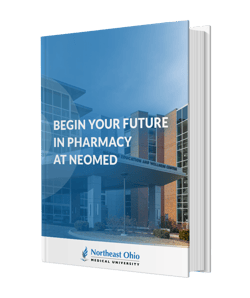
Access our eBook "Begin Your Future in Pharmacy at NEOMED" to learn more about what it takes to become a pharmacist.

About the author
Kelly tomory.
Assistant Director of Admission
More Articles
What do you learn in pharmacy school here are 6 surprising things, how hard is it to get into pharmacy school 3 key application tips, 4 tips for your pharmacy school interview.
- Advertise With Us

- Pharmaceutical Technology
- Clinical Pharmacy
- Pharmaceutical Microbiology
- Pharmacology
- Pharmaceutics
- Pharmacy Management
- Pharma Companies
- Pharmaceutical Machines
- Questions and Answers
- PHARMA MARKETPLACE
- Pharma Marketplace
Tips for Writing a Pharmacy School Personal Statement
Like in any other field of education, a pharmacy statement is a way of selling yourself to the admission tutors by showing them why you are a great pharmacy candidate. A personal statement is an opportunity to detail your skills, strengths, and career objectives in pharmacy. A personal pharmacy statement allows you a maximum of 4000 characters. It would be best to discuss why you are interested in pursuing a pharmacy degree in as few words as possible while ensuring you stand out from the crowd of prospective students.
- 1 Why is a personal statement important?
- 2 What makes a good personal statement?
- 3 Common mistakes to avoid
- 4 What to include in your statement
- 5.1 1. Preparation
- 5.2 2. Proper grammar
- 5.3 3. Proper structure
- 5.4 4. Connect with your reader
- 5.5 5. Include only Pharmacy relevant achievements
- 5.6 6. Avoid plagiarism
- 5.7 7. Avoid controversial topics
- 5.8 8. Proofread your work
Why is a personal statement important?
Statistics show that at least 50% of pharmacy school applications get rejected. These applications are not always denied because of poor scores. These students typically have scored just as good as their accepted counterparts. A personal statement is essential because it is what makes or breaks your application. This is because admission tutors are keen to welcome candidates who are genuinely passionate about and dedicated to the profession.
What makes a good personal statement?
An excellent personal statement uses evidence. Support all your claims. It would be best if you remembered that the admission tutors already know you are trying to convince them that you are a suitable match, as are all the contenders. Sure, you can go on and on about how willing you are to learn, but it would be more effective if you backed such claims with real-life examples.
Please use a personal statement writer service to get professional custom help in writing a good pharmacy personal statement. As a matter of fact, CustomWritings is considered to be one of the most reliable services on the market currently.
Common mistakes to avoid
It is important to remember that the perfect pharmacy personal statement does not have to follow a specific format. Remember that the admission tutors will only review your pharmacy statement for 10-30 minutes, no matter how much time you spend on it. This is not to say that you should rush through it but focus on capturing and maintaining the tutors’ interests. The tutors will review your statement from different angles, meaning you cannot afford to leave room for misinterpretation.
Please resist the urge to follow a predetermined formula you acquired online or from your friends, regardless of how they scored on it. You may easily be tempted to borrow ideas from successful pharmacy students, but this will compromise your authenticity. The admissions tutors have likely seen numerous personal statements so do not embarrass yourself by submitting a copied statement. Besides, you want to show how passionate you are about pharmacy, don’t you?
Read Also: How to Become a Chemistry Problem Solver
What to include in your statement
- Pick a specific pharmacy area you are most interested in and explain why you are interested in that area. Show that you are passionate about that subject (it helps if you are passionate about the area you choose to write about).
- Highlight your motivations for studying pharmacy. When did you realize you wanted to pursue pharmacy? Why? Are you able to support this with evidence from your life?
- Describe your hobbies and extracurricular activities (especially if they are related to pharmacy). The goal is to highlight the skills you have gained from these activities and how they will benefit you in your studies as a pharmacist.
- Include any work experience placements in related fields such as nursing or medicine. Talk about what you learned from these experiences.
- Talk about your traits and qualities that you feel make you a good pharmacy student.
- Please demonstrate that you are a good reader by talking about recent related reads and how they have shaped your thinking. Feel free to respectfully share any views and opinions, always remembering to support them with solid evidence.
How to Write a Good Pharmacy School Personal Statement
Below are a few tips to make sure your statement makes your application stand out and increase your chances of getting accepted into your program of choice:
1. Preparation
Preparation is key. Start early so that you do not end up rushing and producing a mediocre statement. Start planning early as you don’t want to be pressed for time.
2. Proper grammar
Use proper grammar and punctuation. Poor grammar makes for a wrong first impression. Polish your basics on grammar and avoid submitting a statement riddled with error.
3. Proper structure
Structure your statement correctly. Ensure the first statement captures your reader’s attention and then has a few supporting paragraphs. You have a tiny window of grabbing your reader’s attention, so use it wisely. Finally, have a conclusion that ties it all together.
4. Connect with your reader
Connect with your reader, even if it means sharing a few personal stories. The goal here is to make sure you communicate who you are. A personal statement is a monologue to the admission committee, and if they can connect with you, they will like you.
Show the admission tutors that you are aware of the challenges that await you and that you are committed regardless. Talk about how rewarding you think this path will be for you, your family, your community, your patients, and the pharmacy practice itself.
5. Include only Pharmacy relevant achievements
If you have lofty achievements outside the pharmaceutical field, do not include them in your statement. Include only pharmacy-related experiences.
6. Avoid plagiarism
Committee members can always see through plagiarized works, so avoid this at all costs. This will only destroy your credibility in the field.
7. Avoid controversial topics
The personal statement is not a discussion ground for questionable topics. Do not alleviate issues that disagree with the overall subject in question.
8. Proofread your work
Sometimes people miss tiny mistakes by not proofreading their work. Have friends and family check your work and act on the comments. Inadequate proofreading can be catastrophic, so ensure you correctly use your language before sending the statement to the admission committee.
As now you are well acquainted with the components of writing an impeccable pharmacy personal statement , you should have no trouble in getting admitted into Pharmacy school. Pharmacy school is about honor and prestige, and you need the best of luck in this noble endeavor.
Chemistry Problem Solver: How to Become One?
Understanding the Various Types of Hepatitis Virus

July 18, 2024

May 20, 2024

November 10, 2023
Thanks for Sharing the Great Post.
You are welcome. I am happy you found it useful.
I’m very excited to have found out this article, Keep on writing more and more. All Assignments Help
I love dis article
Leave a Reply Cancel reply
Your email address will not be published. Required fields are marked *
- What is the particle size of coarse powder?
- Advantages and Disadvantages of Effervescent Tablets
- Preformulation Studies: Bulk Characterization
- How to Capitalize Your Business
- Beyond Braces: A Look at Modern Orthodontic Care
- WHO Americas Region Country Offices
- How to Reconstitute Oral Suspensions [Step-by-Step Guide]
- We Are Not Just Created To Add Number to the World but To Add Value – Pharmacist Ahmed Yahaya
- COVID-19, Influenza and Sanofi’s Innovative Flu Vaccine
- First Pass Effect Explained
Regulations, Guidelines and Clinical Trials
Important links, submit articles.
- Terms and Conditions
- Privacy Policy
Pharmacy School Personal Statement Tips

Many programs require a personal statement as part of the pharmacy school application. This is essentially an essay that addresses why you want to be a pharmacist, and how your personal background and achievements support this goal. This writing sample provides the only opportunity to express yourself in writing to differentiate your application from your competitors. A significant effort should be made to have the best possible personal statement that addresses the interests of the admissions committee.
- How to write a pharmacy school personal statement

PharmCAS provides general guidance on how to craft a personal statement. Each year, they provide a prompt that directs the topic of the statement. They recommend that applicants do not tailor their writing to one program, because you will only be permitted to submit one personal statement per application cycle. PharmCAS will send this statement to all programs to which you are applying that year.
For many applicants, the personal statement will be the most difficult part of the application preparation. Applicants know this is important, so they may overthink it or suffer from writer’s block. A useful exercise before you begin writing is to think about the answers to the following questions:
- Why do you want to be a pharmacist? You should demonstrate a genuine interest in the profession and helping people.
- What experiences have prepared you to be successful in this career?
- What qualities do you most admire in pharmacists? Can you demonstrate that you have these same qualities through your academic achievements or work experience?
- What makes you stand out as a unique candidate? Do you have real-life experience? Have you volunteered in health care settings?
- Is there any deficiency in your application that you want to proactively explain? This may be your only opportunity to explain any low grades, gaps in education, or suboptimal PCAT scores. However, do not make excuses; own your mistakes and show how you have learned from them.
The personal statement should address the topics that you think are the most important to paint a picture of you as a successful pharmacy student.
The personal statement should address the topics that you think are the most important to paint a picture of you as a successful pharmacy student. Mission statements of the schools to which you are applying can help direct your writing, but you should keep the statement general enough that it can resonate with the admissions committees of any program.
Ultimately, the personal statement is a story that will show the admissions committee that you are a unique person who is worth more than their GPA and PCAT scores. The statement should be an authentic representation of your story and give the reader a glimpse into what you would be like as a pharmacy student and professional. The text should show, not tell, the reader what you bring to the table. A strong opening is important: Grab their attention with a relatable anecdote or quote.

One approach to writing the statement is to brainstorm all the questions above, taking notes as you think of the answers. Then, sketch an outline of the statement that will help get the juices flowing. Try to write the first rough draft in one setting, not worrying about the exact words. You can go back later to refine wording, add details, and revise. Lastly, you should proofread the statement multiple times. Essays riddled with grammatical errors and typos send a message to the reader that you do not pay attention to detail , which is an important skill for pharmacists. Consider having another person who is unbiased proofread it. Numerous companies offer professional essay proofreading and editing services, such as Scribd .
- What does a school look for in a personal statement?
Each program is looking for well-rounded students who are likely to succeed at their institution. They do not expect all students to be the same.
Each program is looking for well-rounded students who are likely to succeed at their institution. They do not expect all students to be the same. Diversity is desirable, so don’t pretend to be something you are not because you think it is what they want to hear. Admissions committees can see right through disingenuous statements. Content that schools may be looking for include the following:
- Is this person applying to pharmacy school for the right reasons? You won’t be happy or motivated in a job that you are doing only for money, job security, or to meet someone else’s expectations.
- Do they understand the job and its demands? Speak to any relevant experience you have working, volunteering, or shadowing pharmacists.
- Has the applicant demonstrated personal growth in the years leading up to their application? If your grades improved in the last year, you can explain that it shows your commitment to education and renewed work ethic. If you took on new extracurricular responsibilities or work assignments, highlight any leadership skills you’ve developed.
- Is the essay organized and clearly written? Communication skills are important for pharmacists, because they communicate with customers, physicians, and insurers daily.
- Has the applicant explained any weak points in their application? Admissions committees realize that life can be messy. Be honest if personal circumstances affected your grades or PCAT scores. Make it clear that you’ve moved past these circumstances and they won’t impact your ability to be a successful pharmacy student. However, don’t make excuses for shortcomings that don’t have a good explanation.
- Do they demonstrate a “fit” for the values of the program? Use anecdotes to demonstrate that you live their values and mission.
Learn More about Pharmacy School Requirements by State
- AR Arkansas
- CA California
- CO Colorado
- CT Connecticut
- DE Delaware
- IL Illinois
- KY Kentucky
- LA Louisiana
- MD Maryland
- MA Massachusetts
- MI Michigan
- MN Minnesota
- MS Mississippi
- MO Missouri
- NE Nebraska
- NH New Hampshire
- NJ New Jersey
- NM New Mexico
- NY New York
- NC North Carolina
- ND North Dakota
- OK Oklahoma
- PA Pennsylvania
- RI Rhode Island
- SC South Carolina
- SD South Dakota
- TN Tennessee
- VA Virginia
- WA Washington
- DC Washington, DC
- WV West Virginia
- WI Wisconsin

- What should you avoid in a pharmacy school personal statement?
Admissions committees have numerous applications to review. You want to make sure every sentence in your personal statement adds value and has no chance of leaving a negative impression. Here are examples of things to avoid:
- Don’t repeat your transcript and PCAT scores. They already have these in their file. Essay word counts are limited, so make the most of every word of your essay to provide new information.
- Don’t write off topic. Tell your story directly and concisely. Going off on a tangent or adding words just to make it appear longer will distract from the message you are trying to convey.
- Don’t include irrelevant academic achievements. No matter how proud you are that you won the geography bee in fifth grade, it isn’t relevant to your aptitude for success in a pharmacy career.
- Do not plagiarize. This is a major sin in academia. It will get your application tossed to the “no” pile without a second thought.
- Avoid clichés. Cue eye roll from the admissions committee who is forced to read hundreds of statements, many with poor attempts to use clichés or humor.
- Do not talk about controversial topics. The essay should be professional. Topics like religion, personal emotions, money, and politics have no place in the workplace.
- Don’t have grammatical errors or spelling mistakes. Hire a professional editor to proofread your writing, or use a do-it-yourself tool, such as Grammarly .
Pharmacy school personal statement examples
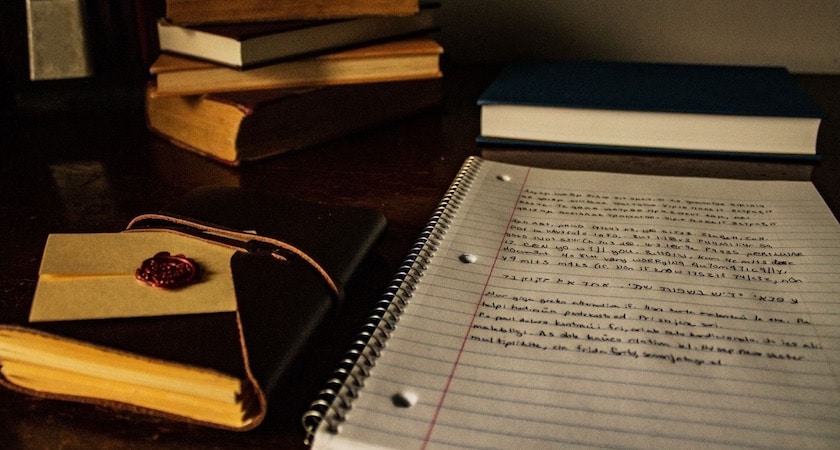
Personal statements are one of the most important components of your application. They are your only opportunity to show the admissions committee that you are more than your GPA and PCAT score. This is your chance to stand out from the crowd. The quality of your essay will be determined by how much work you put into the writing. Several examples of essays from students who were accepted to pharmacy programs can be found on the internet at sites like Studential and Applytouni . Reading these can give you an idea what a good statement looks like before you begin writing your own.
- Additional Resources:
- Pharmacy School Directory
- Pharmacy School Letter of Recommendation Tips
Request Info
Complete this form to request information directly from PharmD program option, tuition, financial aid and more.
Highest Level of Education High School Some College Associates Bachelors Masters or Higher
Phone Number
"By pressing "Request Info" I hereby consent and agree to receive autodialed calls and texts or pre-recorded messages by or on behalf of and PharmacySchoolFinder at the phone number(s) provided above. I understand that the foregoing consent is not a condition of program application or enrollment and agree that the terms of the privacy policy apply."
All fields required
Newsletter Signup
Login your account.
Enter your e-mail address and your password.
- Remember Me Forgot Password?
Register Your Account
Create your account. It will take less then a minute
- I agree to the Terms of Service & Privacy Policy
Writing a Personal Statement for Pharmacy School (10 Tips)
The medicine business will never run out of demand and thus, being a pharmacist is undoubtedly a promising career. If you choose to be a pharmacist and want to get into a good pharmacy school, you need to write a personal statement. It is usually a part of the college’s admission requirements. Not sure how to write a personal statement for pharmacy school? Hey, I’m here to help.
Why is a personal statement important?
10 tips on writing a good personal statement for pharmacy school:, 1. start early.
An amazing pharmacy school personal statement needs a bit of preparation . You do not want to rush it and create a mediocre one, do you? Once you’ve decided which schools you want to apply to, take the time and start planning early about what to write . I’d say it takes at least a month of serious thoughts and several drafts before you can pen down a good one!
2. Introduce Yourself Properly
Start the personal statement with a catchy line to grab the reader’s attention . Once you’ve hooked them to read further, switch to describing yourself next. You must connect with the reader, even if it requires sharing a few personal anecdotes. The aim is to communicate who you are as a person. Think of it as a written monologue you submit to the admission committee. The more the readers connect with you on a personal level, the better the chances they’ll like you and eventually accept you.
3. Have a Proper Structure and Organize Your Essay Well
4. show your enthusiasm and commitment.
Unless you’re passionate about pursuing a career that involves legally preparing and dispensing drugs, you should not apply for admission to a pharmacy school. Your lack of interest would reflect in your essay if you are just applying for the sake of getting into college. Trust me, pharmacy school and the subsequent post-graduate courses you’d attend are no joke! You do not want to be unhappy in the future for choosing this profession halfheartedly. So, once you’re committed to writing your statement, show your enthusiasm through your words. Don’t overdo it, though. There’s a long road of struggle ahead and the admission committee must understand that you’re committed to winning the battle!
5. Do Not Add Fillers
6. include academic successes that are pharmacy-related.
Talking about achievements unrelated to the course will not help you earn brownie points. Why would winning an art contest or achieving top grades in mythology interest the admission committee? On the flip side, are there any distinctive academic successes that connect your aptitude for science or your passion for enrolling in a pharmacy school ? Be sure to include that. Try to show how you are suited for this profession. However, do not force-fit anything by talking about unrelated achievements.
If you excel in science subjects in high school, particularly those that involve laboratory experiments, include this in your statement.
7. Ensure the Grammar and Punctuation are error-free
8. say no to plagiarism.
Plagiarism or copying others’ work is your expressway toward rejection. Not only does it affect your credibility in the field, but plagiarism is also a punishable offense . There are multiple apps and tools to detect plagiarized content, so do not even think of it. Yes, you can research and look through similar examples for ideas on the content and structure. However, always write your pharmacy school personal statement in an original format and your own words. If you must copy an idea from some published sources, make sure that you paraphrase the sentences and paragraphs well.
9. Get a Second Opinion
10. display confidence, final thoughts.
A pharmacist’s job requires hard work, dedication, and utmost passion. If this is your calling, jump at the opportunity of applying to top pharma schools. Keep these tips in mind while writing your pharmacy school personal statement. Did I miss anything above that may have worked for you? Next up, you may want to explore a guide to the best marketable skills you can learn today .
Rafal Reyzer
Hey there, welcome to my blog! I'm a full-time entrepreneur building two companies, a digital marketer, and a content creator with 10+ years of experience. I started RafalReyzer.com to provide you with great tools and strategies you can use to become a proficient digital marketer and achieve freedom through online creativity. My site is a one-stop shop for digital marketers, and content enthusiasts who want to be independent, earn more money, and create beautiful things. Explore my journey here , and don't miss out on my AI Marketing Mastery online course.
- How to Write a Winning Pharmacy Personal Statement with Ease
- Great Ideas for Writing a Killer Pharmacy Personal Statement
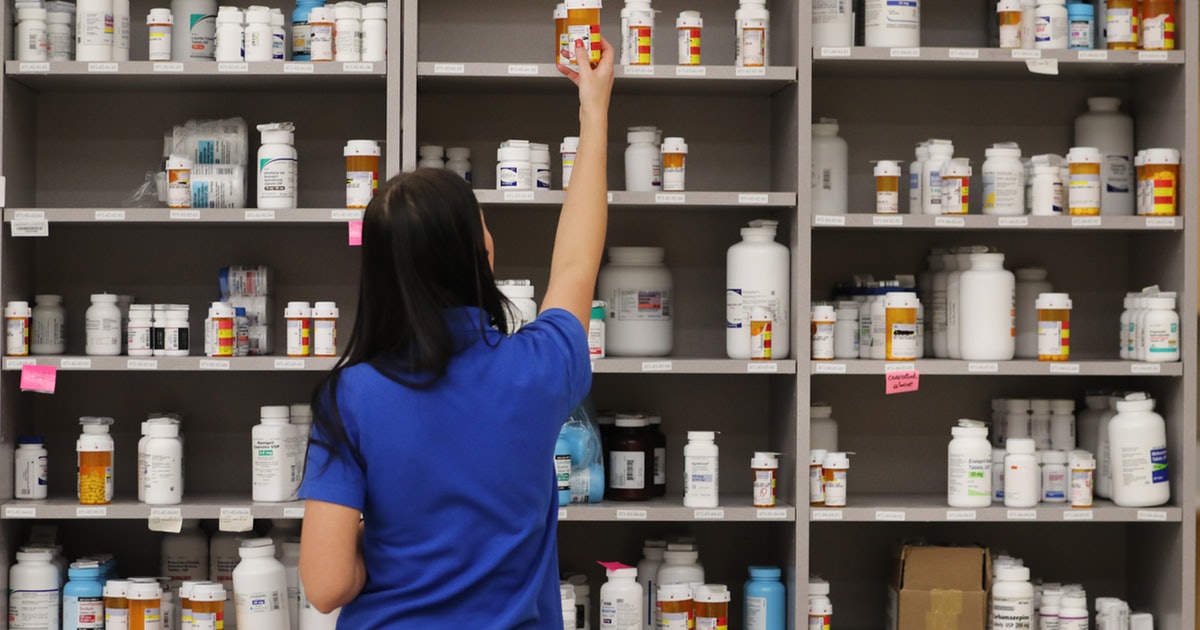
Why is it so important?
Why consider the target audience, how to write the best admission essay for a pharmacy school, the role of an introductory section, why use attention grabbers, your self-reflection, get a second opinion, how to impress your admission officer, dos and don’ts of creating the best pharmacy personal statement, what is a key secret, check compatibility, pharmacy personal statements examples, sample of pharmacy school personal statement – describing the development of student’s interests from the beginning of school, explaining my interest in pharmacy and how i am fit for this college – one of the most popular pharmacy school personal statement topics, my critical view on the current state of the pharmacy science – an alternative pharmacy school essay example., final words.
Writing essays can be difficult for some students. Creating an impressive pharmacy personal statement is a challenge. It’s hard for many people to do the following:
- Come up with an interesting subject;
- Organize important information;
- Make reasonable personal statement conclusions ;
- Grab readers’ interest;
- Reflect related skills or a life experience.
Realize the role it plays in the future career of pharmacists and take your pharmacy school personal statement very seriously. There are many people who want to pursue this career. Most of them have high test scores, good grades, personal achievements, and other strong sides, but only a few of them capture the attention of admission officers.
Use your pharmacy personal statement as a chance to succeed. It should present your personality to the committee. Make sure that it turns uninteresting information, such as awards, grades, courses, and test scores into prominent traits of your individuality. Your personal essay for a pharmacy school should highlight not only your academic accomplishments but also show you as an asset to its community. It makes your application noticeable.
Pay close attention to your target audience because you submit a personal statement to study pharmacy to admission officers who will read and evaluate it. They spend only a few minutes of each application. That’s why your paper should stand out. They analyze not only personal statements, but they also check science GPAs, research projects, letters of recommendation, transcripts, etc. Officers search for candidates with these basic traits:
- Strong analytical skills ;
- Critical thinking;
- High intellect;
- The ability to learn fast;
- Suitable personality for helping people.
Your pharmacy application should leave a lasting impression.
How to write a good personal statement to the chosen pharmacy school? The answer is simple - make sure that:
- It contains a catchy introductory paragraph;
- You use a strong opener;
- It includes a lot of self-reflection;
- You get a second opinion.
The introduction plays a decisive role because it can either grab readers’ interest or ruin your application success. Write it when the main body is ready. This paragraph serves many important functions, such as providing the audience with a short plan of what you will tell them further.
Use catchy attention grabbers in your opening lines or sentences to add more color to your paper without overdoing with intrigue. Opt for neutral starters if you share a really meaningful experience.
The best application to a pharmacy school involves a lot of self-reflection, sincerity, and honesty to make it easier for readers to relate to it. You may find it hard to share your life experiences and feelings, but it’s something you need to do to stand out. Don’t go overboard.
Ask other people (your friends or family) to read your final draft and share their opinions. Their advice can help you transform a mediocre paper into a brilliant and winning one because they encourage you to look at it from different angles. Otherwise, you may revise your essay many times in vain.
"Before I answer this I’d like to state upfront that there are three hurdles that applicants must clear to gain admission to the top colleges. So bear in mind that you can’t focus on just one quality for your candidacy at the expense of others. This said, most admissions officers to whom we have spoken agree that demonstrating fit is the one quality that most impresses them when reviewing applications. This means showing the school that you understand what makes it unique as well as what you have to offer and, consequently, why you sincerely want to attend that school. Far too many applicants view the admissions game as purely numeric. Smart applicants realize they need to put 100% of their best effort into each stretch school they target. Consequently, they understand why it is better to apply to 10 schools with each application reflecting 100% of their best effort than to get stretched too thin and apply to 20 schools with each application only reflecting 50% of their best effort. So, in conclusion, be sure to spend the time to demonstrate a strong fit with each stretch application you submit. Quality will triumph quantity every time." By admission consultant David Petersam.
If you lack enough experience in this field, look at dos and don’ts because they will guide you in the right direction. What should you do?
- Start early to set aside enough time to complete all stages;
- Keep the target audience in mind;
- Use a correct structure;
- Organize all ideas to keep readers’ interest;
- Use proper punctuation , grammar, and tone;
- Mention future goals;
- Reveal your true personality;
- Edit and proofread a final draft a few times.
What are the things that can ruin your admissions essay?
- Repeating the same ideas (they make your application to a pharmacy school boring and weak);
- Including a tangential discussion;
- Being in a hurry;
- Exceeding a word count;
- Making excuses;
- Using redundancies and fillers;
- Expressing your viewpoints on controversial topics;
- Underestimating the chosen profession;
- Making your pharmacy school statement too emotional or personal;
- Listing irrelevant achievements.
Take into account the basic criteria that define the overall success of your pharmacy school application:
- Appropriateness;
- Time management.
The key secret of writing a successful application is to convince admission officers in your interest and dedication to the chosen specialization. How can you do that? Tell them about the impulse that led to this decision. Explain your desire to pursue a pharmacy career path clearly to let the committee understand your reasoning and logic behind it.
Know why you want to prosper in this profession. Give the answers to some basic questions to determine the following:
- What attracts you in this field?
- Why did you choose pharmacy?
- What does a pharmacist do?
- What inspires you to study hard?
- The life event that spurred you to choose this career.
- How you differ from other applicants?
Helping people was my passion beginning from studying in elementary school. At first, it was mostly assisting my parents and neighbors but later I began reading the special literature and even developed a specific interest in chemistry and microbiology books (as well as related free online content on related Web resources). This was a powerful motivation for me to achieve higher grades during my studies because of understanding of the necessity to enter a higher education institution afterward. After graduating from high school I had to choose between medical sciences and pharmacy services fields and finally decided to stay with the latter.
Applying to this college means a lot to me. I believe that after studying here I can obtain the most valuable knowledge and support to pursue my career in the area of my interest and also to bring some real value and positive results to the society which generally summarizes my ISAT personal statement on this decisive day. Pharmacy terminology is like a special language which I have started to learn and hope to master completely quite soon.
Looking for dental school personal statement or personal statement for residency ? Browse our library, you will find everything there with ease.
Chemistry and biology were my favorite subjects during the whole process of studying, particularly because some of my relatives have been working in these spheres. There were a lot of specialized books (not only in the English language) on related subjects at my home so as a passionate reader I have explored all of them early enough, during my free time. Eventually, it led me to building solid plans of continuing my learning in a pharmacy college, improve my medical skills and obtain great experience.
After graduating from my high school with a diploma with honors, I feel prepared to enter this college and to successfully obtain a degree which will allow me to proceed to higher levels of scientific research and reach the maximum of content because of this knowledge. My skills include all basic kinds of chemistry operations, basic knowledge about microbiology, familiarity with most widespread kinds of germs and medicine (antibiotics and others), first aid services, vitamins and their influence on children and adults, volunteering, etc. In this letter of intent, I would like to express my hopes and dreams which might come true as a result of this application day.
Unlike many people I know, I’ve never regarded science as something far away from daily life, especially pharmacy and chemistry which are so much involved into everyone’s existence. Observing tangible effects of work, bringing support to the society and helping out people that are close to me – these are the main factors motivating me to proceed with professional studying in the U.S. or international pharmacy field. This is the first of my personal statements for this college and I am happy for this opportunity to be free to speak up.
Apart of basic chemistry and biology knowledge received in the process of my general learning and additional online training, I have read a lot of specific research works and eventually became familiarized very well with the history of pharmacology theory and practice in the U.S and Canada beginning from the late 19th century up to the modern day, particularly with problems and challenges which have been noticed lately in this sphere ( antibiotics overuse is one of the brightest examples). My dream is to play a notable part in dealing with those challenges and making certain contribution to the development of better results of medicine services for everyone!
Your admission essay is a great chance to show who you really are and focus on your positive traits. What if you can’t write it yourself? Get expert help not to compromise your academic future. Hire professional personal statement writers to do this job and let them help you succeed and submit an impressive application and cool personal statements that support you with ease.
If you are applying for a nursing degree at university, then you should attach a personal statement to your application and take care of its stellar content. Being one of the most important selling points in your bachelor degree application, your nursing personal statement should demonstrate that yo...
Some students think that the residency personal statement (RPS) is the same as the graduate essay, but it’s not quite right. Personal statement residency is one of the great ways to share your character and abilities and plans for your career as a physician. One of its goals is for applicants to add...
If you want to become a law school student, you don’t have any chance to explain to the committee why you’re a perfect fit, except for your application. Look for legal examples to get the academic consulting necessary to submit a successful law school personal statement and succeed at the interview....
- AI Content Shield
- AI KW Research
- AI Assistant
- SEO Optimizer
- AI KW Clustering
- Customer reviews
- The NLO Revolution
- Press Center
- Help Center
- Content Resources
- Facebook Group
A Quick Guide to Writing Pharmacy School Personal Statement
Table of Contents
When it comes to applying to pharmacy school, your personal statement is one of the most important pieces of your application. It’s your opportunity to stand out from the rest of the applicant pool. So how do you write a personal statement that will make an impression? This article provides valuable tips and a pharmacy school personal statement sample to study and use as inspiration while writing one for yourself.
So read on for everything you need to know about writing a successful pharmacy school personal statement!
What Is a Pharmacy School Personal Statement?
Pharmacy school personal statements are documents that allow pharmacy students to introduce themselves and their reasons for wanting to attend pharmacy school. They can also highlight any unique experiences or qualifications the student has that would make them a good candidate for admission into pharmacy school.
Personal statements are important because they help admission committees get to know potential students beyond just their grades and test scores. Your statement should be well-written, honest, and reflective of who you are as a person.
What Do Colleges Look for in Pharmacy Students?
The skills and qualities that colleges look for in pharmacy students typically include the following:
Strong Analytical and Problem-Solving Skills
Pharmacy is a science-based profession, so the ability to think critically and solve complex problems is essential.
Solid Math Skills
A foundational knowledge of math is necessary for understanding the concepts behind pharmaceutical calculations.
Excellent Communication Skills
The pharmacist’s role involves communicating with patients, other healthcare professionals, and pharmacists at different pharmacies. Good communication abilities are essential for success in this field.
Passion for Helping Others Improve Their Health
Pharmacists play a significant part in improving patient care. So it’s important that potential students have a sincere desire to help others achieve better health outcomes.

Tips to Write a Pharmacy School Personal Statement
Here are some practical tips to keep in mind when writing your pharmacy school personal statement :
- Start early: Give yourself plenty of time to write a strong personal statement. This isn’t something that can be rushed, so start thinking about it well before the application deadline.
- Be specific: Don’t just say that you want to become a pharmacist because you like helping people. Give concrete examples of how you’ve helped others in the past and what motivated you to pursue this career path.
- Sell yourself: Emphasize your strengths and why you believe pharmacy is the right fit for you. Think about what sets you apart from other candidates.
- Show, don’t tell: Rather than simply stating your goals or qualifications, use anecdotes or stories to illustrate them. This will make your essay more engaging and unique.
Pharmacy School Personal Statement Sample
Use the following pharmacy school personal statement sample as inspiration to craft your own:
Ever since I was a little girl, I loved going to the pharmacy with my mom. Watching her talk to the pharmacist always fascinated me and sparked my interest in pursuing a career in pharmacy. As I grew older, I began to realize that pharmacies are more than just places where you can buy medication. They play a crucial role in our healthcare system by ensuring that medications are dispensed correctly and safely. This is why I am so passionate about becoming a pharmacist myself. I want to help contribute to making sure that people have access to quality medications when they need them most.
While attending college, I had the opportunity to work as an intern at several different pharmacies. This gave me invaluable experience working directly with patients and pharmacists alike. Through these experiences, I developed a strong love for chemistry and pharmacology. This has only solidified my desire to pursue a degree in Pharmacy once I complete my undergraduate studies.
Ultimately, my goal is to become licensed as PharmD and work within a community or hospital setting. I want to dispense medication prescribed by physicians optimally and safely to facilitate patients’ healing process. Providing high-quality care combined with warmth, compassion, and individualized service excellence will make a difference in the lives of those we encounter every day.
The purpose of a personal statement is to give the admissions committee a preview of what you have to offer as a prospective student . It allows a recruiter to form a personal opinion of you.
This article provides valuable tips with a strong sample to help you craft a pharmacy personal statement and present yourself as a qualified applicant.

Abir Ghenaiet
Abir is a data analyst and researcher. Among her interests are artificial intelligence, machine learning, and natural language processing. As a humanitarian and educator, she actively supports women in tech and promotes diversity.
Explore All Write Personal Statement Articles
How to draft meaningful length of law school personal statement.
Are you confused on how to write a law school personal statement? One of the essential elements of your application…
- Write Personal Statement
Effective History and International Relations Personal Statement to Try
Are you considering studying history and international relations? Or you may be curious about what a degree in this field…
Guide to Quality Global Management Personal Statement
Are you applying for a global management program and want to stand out from the crowd? A well-written personal statement…
How to Draft Better Examples of Personal Statements for Residency
Achieving a residency can be a massive accomplishment for any aspiring medical professional. To secure your spot in one of…
Tips for Drafting a Free Example of Personal History Statement
A personal history statement can be crucial to many applications, from university admissions to job search processes. This blog will…
Writing Compelling Dietetic Internship Personal Statement
Applying for a dietetic internship is a rigorous process and requires submitting a personal statement, which is an essential part…

- UCAS Guide >
- Pharmacy Advice
Writing the Perfect Pharmacy Personal Statement: Expert Tips
Crafting the perfect pharmacy personal statement can be a nerve-wracking endeavour. With the high stakes and fierce competition, how do you make your application stand out ?
In this blog, we’ve gathered expert tips to transform your personal statement from average to outstanding. Whether you’re a seasoned wordsmith or find writing daunting, our practical advice will steer you in the right direction.
Let’s dive in and unlock the doors to your dream pharmacy school!
How to Write a Pharmacy School Personal Statement
Crafting a compelling pharmacy school personal statement is crucial to making a lasting impression on the admissions committee . Your personal statement is a powerful tool to showcase your passion for pharmacy and demonstrate how your background and achievements align with this career path.
To help you create an outstanding personal statement that sets you apart from other applicants, follow these essential steps :
1. Research and Understand the Requirements
Before you begin writing, thoroughly research the pharmacy schools you’re applying to and understand their specific requirements for personal statements. While some schools may provide prompts, others may allow more flexibility in your topic choice. Take note of any word limits or formatting guidelines to tailor your statement accordingly.
2. Showcase Your Genuine Interest in Pharmacy
Start your personal statement by showcasing your authentic passion for pharmacy. Explain why you want to become a pharmacist and how this career aligns with your personal goals and values. Share a significant experience or moment that ignited your interest in pharmacy, and highlight how helping people and making a positive impact drives your ambition.
3. Highlight Relevant Experiences and Achievements
Pharmacy schools value applicants with diverse experiences and achievements that reflect their readiness for this profession. Identify experiences, such as volunteer work, internships, or relevant coursework, that have prepared you for success in pharmacy. Describe how these experiences have shaped your skills and character, making you a well-rounded candidate .
4. Demonstrate Qualities of a Successful Pharmacist
Showcasing the qualities of an excellent pharmacist is crucial in your personal statement. Discuss the attributes you admire in pharmacists, such as empathy, problem-solving abilities, or effective communication skills. Substantiate your claims by providing concrete examples from your academic achievements or work experiences that exemplify these qualities.
5. Emphasise Your Uniqueness
Stand out by highlighting your unique strengths, qualities, or experiences . If you have real-life experience in the healthcare industry or have volunteered in relevant settings, share these aspects to demonstrate your commitment to pharmacy and your understanding of the field.
6. Address Any Weaknesses Proactively
If your application has any weaknesses, such as low grades , consider addressing them proactively in your personal statement. However, avoid making excuses and instead focus on how you have learned from these challenges and how they have shaped your determination to succeed.
7. Structure Your Personal Statement Effectively
A well-structured personal statement is easier to read and leaves a lasting impact. Organise your statement into an introduction, body paragraphs, and a conclusion. Each paragraph should address specific points or themes coherently. Begin with a compelling opening that captures the reader’s attention and maintains their interest.
8. Craft a Strong Opening Paragraph
The opening paragraph is your chance to make a strong first impression . Consider starting with an engaging anecdote, a thought-provoking quote, or a captivating question that hooks the reader. This will set the tone for the rest of your personal statement and encourage the admissions committee to continue reading with enthusiasm.
9. Show, Don’t Tell
Avoid vague statements and use descriptive language and vivid examples to illustrate your qualities and experiences. Show the admissions committee how your skills and attributes have manifested in real-life situations , reinforcing your suitability for pharmacy school.
10. Seek Feedback and Revise
After completing your first draft, seek feedback from trusted individuals, such as teachers, mentors, or peers. Accept constructive criticism and make necessary revisions to refine your personal statement further. Multiple rounds of proofreading and editing will ensure your statement is error-free and communicates your message effectively.

Avoiding Common Mistakes in Pharmacy Personal Statements
Writing a pharmacy personal statement can be challenging, but avoiding common mistakes can significantly improve its impact on the admissions committee. Your personal statement reflects your passion for pharmacy and your suitability for the profession.
To help you create a compelling and polished personal statement , let’s explore some common errors to avoid and essential proofreading and editing tips to ensure a stellar final draft.
Generic Statements:
One of the most common mistakes applicants make is using generic or clichéd statements that lack originality. Avoid using overused phrases and anecdotes that do not truly represent your experiences and motivations.
Lack of Focus:
Your personal statement should clearly focus on pharmacy and why you are passionate about pursuing this profession. Avoid including unrelated experiences or irrelevant details that may distract from your main message.
Exaggeration and Overconfidence:
While it is essential to highlight your strengths and achievements, avoid exaggerating or appearing overly confident . Be honest and genuine about your experiences and abilities.
Grammatical Errors and Typos:
Spelling mistakes, grammatical errors, and typos can create a negative impression on the reader. Proofread your personal statement thoroughly to eliminate any such errors.
Long and Unstructured Paragraphs:
Lengthy, unstructured paragraphs can make your personal statement difficult to read. Aim for concise and well-organised content to keep the reader engaged.
Focusing Solely on Academics:
While academic achievements are crucial, a pharmacy personal statement should also emphasise your personal qualities, motivation, and relevant experiences that align with the profession.
Final Takeaways
Mastering the perfect pharmacy personal statement is vital for securing your dream program . Our expert tips will help you create a captivating, error-free statement highlighting your passion for pharmacy. Tailor it to each school, showcase your future goals, and stay authentic.
A well-crafted personal statement can set you apart from other applicants. Follow the guidance this Medic Mind blog provides, and best of luck on your journey to pharmacy success!
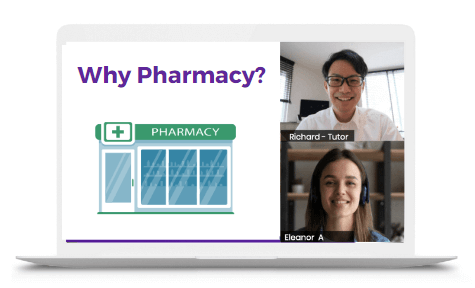
→ Q: Should I include my academic achievements even if they are not directly related to pharmacy?
A: Yes, including relevant academic achievements can showcase your dedication and discipline. However, focus on highlighting experiences that demonstrate your passion for pharmacy.
→ Q: How long should my pharmacy personal statement be?
A: Aim for a concise statement, ideally one to two pages. Ensure it includes all essential information while keeping the reader engaged.
→ Q: Is it necessary to mention extracurricular activities in my personal statement?
A: Including extracurricular activities can show a well-rounded personality. Highlight experiences that demonstrate your leadership, teamwork, and commitment to service.
→ Q: Can I address any weaknesses or gaps in my academic history in the personal statement?
A: Yes, you can briefly address any weaknesses or gaps, but focus on how you have learned from those experiences and how you plan to overcome them in your pharmacy journey.
Cancel reply
Please provide the mobile number of a guardian/parent
If you're ready and keen to get started click the button below to book your first 2 hour 1-1 tutoring lesson with us. Connect with a tutor from a university of your choice in minutes. (Use FAST5 to get 5% Off!)

The Pharmacy Personal Statement Guide w/Prompts & Examples
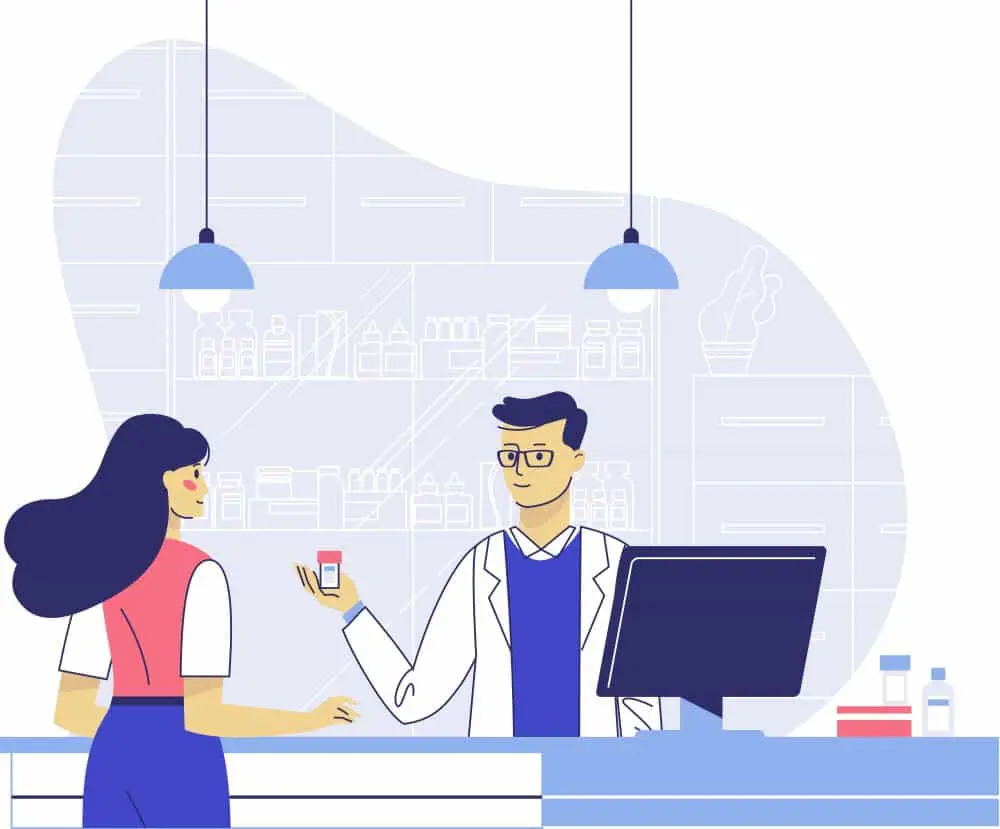
The Importance of Writing a Great Pharmacy Personal Statement
To become a pharmacist anywhere in the UK, you’ll need to be registered with the General Pharmaceutical Council (GPhC) and have, at minimum, a master’s degree from an accredited university. This requires you to enter into a graduate-level programme for pharmacology. When applying to these types of programmes, it’s very important that you have a strong pharmacy personal statement.
When it comes to applying to a pharmacy programme at the graduate level, there are many requirements to meet. Many of these come in the form of prerequisites you need before you can be considered for grad school.
Pharmacy Programme Prerequisites
The common prerequisites for applying to university for pharmacology mostly involve classes you should’ve taken before applying to the programme. These classes include three (3) A-levels in the following subjects:
- and various Maths
You must receive a grade of B or higher in each of these for it to meet the prerequisite.
You must also take five (5) General Certificates of Secondary Education, otherwise known as GCSEs, in the following subjects:
- Various Maths
- English/Language
For these courses, you must have received a grade of C or higher.
There are a few alternate routes you can take if you don’t meet the above listed prerequisites. These include having a foundational degree in the field of pharmacy, having an HNC, HND or BTEC with a science focus, having earned the equivalent qualifications at an Irish or Scottish university and a few others. Having work or internship experience with a pharmacist also helps.
Depending on the particular Uni you plan on attending, you may have some additional institutional requirements. These will be listed on the university’s website and/or in the admissions packet for the school.
Steps to Obtaining Admission
Once you’ve covered all your prerequisite courses, it’s time to start the actual process of admissions. Do your research first; find the best Uni for you and check the website to see what types of admissions requirements they have in place. Some universities require you to take the PCAT (Pharmacy College Admissions Test) and earn a certain score before they’ll consider you for admission.
If you’ve not already taken the PCAT, though, check the admissions requirements for your particular Uni to see if you need to do so. Several universities across the country are eliminating the PCAT requirement, and there’s no reason to take it if it isn’t a requirement for your specific school. The next step is to fill out and submit an application to the school.
Applications require a lot of personal information, including your name, contact information, educational history, professional resume, personal and professional references, and a pharmacy personal statement, which is one of the most important parts of the application packet. Some universities require you to pay a fee or provide them with a fee waiver when submitting your application.
After you’ve submitted your application, it’ll be reviewed by the university’s admissions team. At this point, they may call you in for an interview . After that, you should be ready to enter the pharmacy programme.
But how do you make sure you get to the interview stage? Aside from having good grades and an impressive personal resume, writing an exceptional and memorable pharmacy personal statement is the best way to make sure you’re called in for that final step.
What is a Pharmacy Personal Statement?
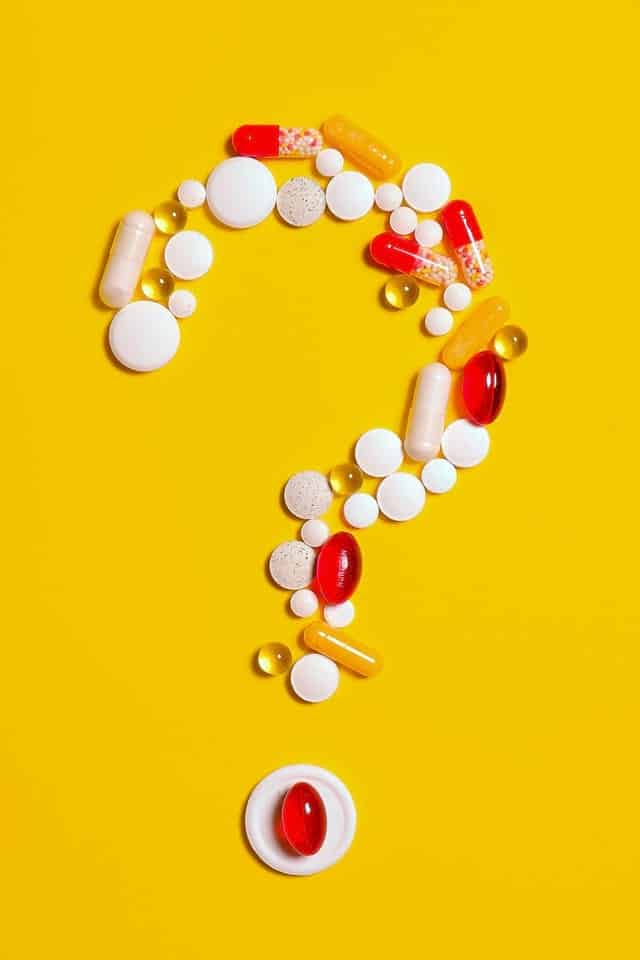
A pharmacy personal statement is a personal essay you write about yourself. Many unis will give you a specific prompt to help guide your writing. For those few that don’t, there are several things you’ll want to include , such as why you want to pursue pharmacology, what about that particular university’s programme appeals to you, any achievements or awards you’ve received, any relevant internship or work experience and why you’d make a good candidate.
There are also attributes about yourself you’ll want to mention in your personal statement. These are things you can’t simply write out in sentences. Instead, you’ll want to discuss relevant topics and tell personal stories that show that you have these qualities without you directly saying, “ I work well with others and have good communication skills. “
These important attributes include, but aren’t limited to:
- Excellent people skills
- Strong attention to detail
- Honesty and integrity
- Good communication skills
- The ability to work on a team
- Leadership skills
- Strong organisational skills
- Highly motivated to succeed
- A strong sense of responsibility and professionalism
All of these qualities make you a good candidate for a pharmacy programme. The more of these you can show you have, the more likely you’ll be called for an interview.
What is a Prompt, and Why Should You Follow It?
If your specific university provides you with a prompt, they’re simply giving you a question to help focus what you write about in your personal statement. There are several different prompts unis use, and we’ll discuss some of the most common of those later.
No matter what the prompt is, it’s important you answer it completely. Most universities use prompts relative to your interest in pharmacology, your educational history, or attributes that would make you a good candidate for their programme. There will occasionally be a prompt that surprises you though. In those cases, still, answer the prompt.
Be as honest and as thorough as you can, and remember, even if the prompt is something strange or unusual, there are usually still ways to work in stories that show you in your best light. You may just have to be a little more creative.
Below, you’ll find a few of the most common prompts for writing your pharmacy personal statement on your admissions applications.
Pharmacy Personal Statement Prompts
Prompt 1: tell us about yourself (kings university london).
Many universities use a very vague prompt that just instructs you to talk about yourself. As Kingston University London puts it, “You are the main topic of this essay.”
This is a great, easy prompt to get. Don’t be afraid to be honest and really talk yourself up in this kind of statement.
For this particular prompt, you’ll want to cover everything we mentioned above, particularly why you’re interested in pursuing a career in Pharmacy, what education you’ve had that qualifies you for the programme, any relevant work or leadership experience that would make you a good candidate and anything that showcases the attributes we listed above.
Again, be honest and as thorough as possible. Remember, the goal of this statement is to make you memorable and desirable. As a result, talking about all the great accomplishments or achievements you have isn’t bragging or boasting. It’s what’s required if you want to stand out from the other applicants.
Prompt 2: Demonstrate your commitment to pursuing a career in Pharmacy, and tell us why you’re better suited to the programme than other applicants (King’s College London).
This prompt is quite similar to the above “Tell us about yourself” prompt. In it, you’ll cover much of the same things, especially when you start talking about why you should be chosen for the programme over other applicants.
Just remember that there’s a direct question about why you want to work in pharmacology. Because it’s being asked directly, you want to spend a bit of time giving a complete answer. You can talk about why you became interested in pharmaceuticals in the first place. Was there a specific event in your childhood that inspired you to want to help take care of sick people? Have you had a strong love of chemistry for as long as you can remember? What inspired you to choose this field over all the over available career fields?
This prompt also allows you to talk about your career goals. What do you want to do with your MPharm once you get it? How is this degree going to help you in those goals, and how are you going to use your skills and your degree to make the world better once you do get a job? It would also benefit you to talk about the classes you’ve already taken and the work you’ve already done to work towards your goals.
Prompt 3: What benefits do you expect to gain from admission into our programme? (Cardiff University)
For this prompt, you can still talk a little about why you chose pharmacology and what you hope to do with your degree once you’ve earned it. More importantly, though, you’ll want to answer the actual question the prompt asks. What are you hoping to gain from this particular programme that sets it apart from all the other pharmacy programmes you could have chosen instead?
Talk about specific courses or labs for which this programme is well-known. This is a great way to showcase that you’ve done your research and really looked into what this university has to offer. By highlighting particular aspects of the programme, you prove to the admissions team you didn’t just pick this university on a whim or because it was the closest one to your flat. Instead, you did some reading and compared the programme to those at other schools and decided this one was the best fit for you because… You fill in the blanks!
Proving to a school that you know something about the school and that you hope to gain the actual knowledge and skills they’re famous for providing to students is a huge point in your favour. This specific prompt allows you to do that.
Prompt 4: Tell us about any work experience, internships, leadership positions you’ve held or outside activities that would support your application for admission (The University of Manchester).
This prompt is another one that’s similar to the “ Tell us about yourself ” prompt. In answering this prompt, you’ll be able to talk about yourself, your history, your past accomplishments, your interest in pharmacy, and more. You’ll want to put your largest focus, though, on the actual work you’ve done to prepare you for entrance into this programme.
This could include any of the following:
- Working in an actual pharmacy or closely related field
- Internships, volunteer experience or other placements within a pharmacy or related field
- Any work experience you’ve had where you were part of a team or, even better, the leader of a team
- Educational experience that would prepare you for the programme
- Any honours you’ve received that show you to be exceptional in any relevant field
These are only a few examples of things you could discuss in response to this prompt.
Standard Pharmacy Personal Statement Format
No matter the specific prompt you’re given, there’s a general format you’ll use for most personal statements. Occasionally, a university will provide you with specific formatting instructions. If they do, you always want to follow those instructions exactly. If you aren’t provided with instructions, this is the general format preferred for most UK unis and their US counterparts for essays and/or personal statements:
- MLA formatting guidelines
- One-inch margins on each side of the page
- (For the UK) Any professional font as long as the italics are noticeably different – most students use Times New Roman, Arial or Courier
- (For the US) Times New Roman or Arial font
- Font size – 12 pt.
- Double-space, but add no extra lines between paragraphs
- Indent the first line of each paragraph
Additionally, you’ll use the standard Intro-Body-Conclusion format that most MLA essays utilise.
Step 1. Introduction
Depending on the specific prompts people are given, each introductory paragraph will be a little different for each student. Generally, though, this is where you’ll introduce yourself and talk a little about why you’re interested in studying pharmacology in general and why you’re interested in studying at that university specifically. You’ll also want to catch the reader’s attention immediately, in the opening line if possible, but without using gimmicks or something overly dramatic.
According to a how-to guide on the Birmingham City University website , “The most effective opening sentences are simple, to the point and personal to you.”
You’ll also want to avoid writing in cliches or using overused phrasing that everyone else uses. Be original. Be specific. Really help the admissions team understand your drive and passion for pharmacology.
Step 2. Body Paragraphs
Your body paragraphs are where you’ll put the majority of your information. These are the paragraphs where you’ll really dive into answering the question(s) the prompt asks. Unless you’re asked to write an abbreviated personal statement of just a couple hundred words, you should never have less than two body paragraphs, and it’s better to have between three and six.
You want to be comprehensive in your writing; include everything the admissions team might need to hear to sway them in your favour. This generally takes more than a couple of short paragraphs. Remember to indent the first line of each paragraph, and make sure they’re written in an order that makes sense. Don’t jump around from paragraph to paragraph. Make sure each transitions smoothly into the other.
Step 3. Conclusion
In the conclusion of your pharmacy personal statement, you’ll want to bring your entire essay to a smooth, sensible close. Don’t use your conclusion to restate everything you’ve already written. Instead, use it as a place to briefly touch on how entrance into the programme will help you succeed in your future goals.
Also, if it feels appropriate and doesn’t detract from the overall feel of your personal statement, take the time to thank the admissions team for reading it and considering you for application into their school’s pharmacy programme. Be aware that this isn’t always appropriate. If, after adding in the thank you, it seems forced or like it was written just to add more words to an essay that was a little too short, take it out.
Examples of Pharmacy Personal Statements
Example personal statement 1.
“I have gained valuable knowledge studying Chemistry, Biology and Maths which will be beneficial for the Pharmacy course. In Chemistry, I have done a series of experiments which require analytical and evaluative skills such as accurate reading when using burettes. I find the organic Chemistry module rather interesting as I enjoy studying the different reactions of aldehydes and ketones and how these reactions and organic products differ due to the different functional groups present in each compound. Another aspect of chemistry I enjoy is the purification of organic compounds.”
– Read the rest here
This is the second paragraph of a pharmacy personal statement, and it’s a great example of how to answer a prompt that wants you to discuss any relevant experience you’ve had that could help you in the programme.
This student mentions many of the different science and mathematics courses she’s taken in pursuit of her pharmacy degree, but she doesn’t just list them. She goes into great detail about some of the things she’s done in those classes.
This is excellent for a few reasons. First of all, it’s evident in her writing that she greatly enjoyed the classes she took. This shows that she has a passion for the work she’ll have to do to obtain her MPharm. Universities much prefer to have students on campus who are truly invested in and enjoying the work they’re doing.
Additionally, she uses specific terms – “ketones,” “burettes,” “aldehydes” and more – which shows she has actual knowledge and understanding of the field. We can tell that she’s a knowledgeable, hard-working student who has, thus far, retained the information she learned in her undergraduate courses. Everything about this personal statement was done well.
Our Verdict:

Example Personal Statement 2
“I am interested in the Masters of Pharmacy (MPharm) Programme because I am interested in the modules on which it is based. I want to do the MPharm programme so as to extend my knowledge in Medicines. I would like to get a deeper understanding of how to formulate and administer drugs safely.
I would qualify for the Mpharm programme because I have recently completed BSc in pharmaceutical Science which has given me good understanding of how drugs work. The modules I have undertaken In my BSc Pharmaceutical Science will help me navigate successfully in the MPharm programme.”
This personal statement is a little less impressive than the first one. First of all, there’s not really an opening line. When writing a pharmacy personal statement – or a personal statement of any kind, for that matter – you want to have a nice first sentence that breaks the ice and starts the statement off in a fluid manner. This student just jumps right in and answers the question being asked. There’s no lead-in, no story being told.
The grammar in this particular sample isn’t great either. There are randomly capitalised words (“undertaken In my BSc”) and missing words (“given me good understanding”) and a few other problems that could have been addressed by good editing. This is a testament to why you should always proofread and edit your papers before submitting them. It’s even better to give them to a new set of eyes to edit for you if possible.
The two most bothersome things about this sample, though, is that it’s vague, and the sentences are choppy. The student mentions things he’s done (“ recently completed BSc in pharmaceutical Science “) and why he wants to be in the programme (“ because I am interested in the modules on which it is based “), but he gives absolutely no specifics.
He doesn’t talk about anything he learned in his BSc courses that furthered his love of pharmacology, and while he says he’s interested in the programme’s modules, he doesn’t mention a single specific module or why it interests him. We’re just given the bare minimum with no detail – the burger without the cheese and veggies. It’s boring.

Finally, his sentences are horribly choppy. With the exception of one single sentence, each of his sentences starts with the word “I” – “I am,” “I want,” “I would.” There is no variation at all to his writing. It’s boring and makes the reader lose interest. You’ll want to change up the flow and style of your sentences regularly. It adds a little flair and makes your personal statement less monotonous.

Example Personal Statement 3
“Pharmacy has the ability to change people’s lives. Whether it is at the level of the community pharmacist offering the best advice possible to common illnesses, to high-level research into drugs that could cure a range of chronic or life-threatening diseases, the role of the pharmacist cannot be overestimated. As a motivated and hardworking individual, with a desire to understand the fascinating human body along with a joy of helping other people, I strongly believe that studying pharmacy will give me one of the final and most important step towards a rewarding career in the developing field of pharmacy.”
This is another stellar example of what a pharmacy personal statement should be. The writer begins strong with a unique and memorable opening sentence. He tells us, right from the first sentence, one of the reasons he wants to work in the field of pharmacology, but he does so without monotonously and obviously saying, “ I want to be a pharmacist because I think pharmacy can change people lives .” Instead, he simply and concisely says, “ Pharmacy has the ability to change people’s lives. “
It’s a great opening line, and it gives us insight into his reasons for going into the pharmacy field as well. He follows that up with a sentence that shows he’s knowledgeable about different career opportunities in the field of pharmacology.
Then he smoothly transitions into why he, himself, would do well in this field. He tells us he’s hardworking and motivated, but he does so in a way that doesn’t just state those facts outright without context.
He then once again tells us about his interest in the field and also shows us he is someone who enjoys working with and helping others. Finally, he sums up his introduction by leading into what he hopes to gain from the programme.
Although the next paragraph isn’t listed here, it, too, is a smooth transition into the educational and work experiences he’s had that prepared him to do well in the programme. Everything about this personal statement is well-organised, with each paragraph flowing smoothly into the next, and the whole thing covering everything that should be covered in a personal statement.

Example Personal Statement 4
“I am interested in studying chemistry and biology because I would like a career that plays crucial role in public’s health.
I was previously working as a retail assistant and the experience has led me to deal and understand different kind of people. I learnt to keep myself calm, whilst working under pressure environments.
This job has also taught me to work in a fast-paced environment to meet the customer`s demands. This skill will be useful to meet the deadlines while doing my course and working as a pharmacist will enable me to provide good customer services.”
This personal statement is another example of what not to do when writing your own statement for admission into the pharmacy programme.
First of all, the introduction paragraph, shown here in its entirety, is much too short. You have to be an excellent writer to turn one sentence into a paragraph and make it work, and this writer didn’t do that. Your introduction should never be only one sentence. It needs to be fleshed out and thoroughly written. There are some glaring grammatical errors as well.
The next problem with this statement is that the work experience the student writes about isn’t really relevant to the programme she’s trying to enter into. She does an admirable job of trying to make it relevant, by talking about how it helped her learn to work with a multitude of different people and taught her to work quickly, but it doesn’t really work.
Most unis want to know that you have relevant work experience. If you don’t, it’s better to mention placement experiences or internships you’ve had that are relevant as opposed to irrelevant work experience. Even if you only worked in a pharmacy for a day as part of a class project, that’s okay. You can learn a lot in a day, and you can make that work in your writing.
Unless you’re really good at making non-relevant experience seem like it has actual relevance to the programme, it’s better to leave it out altogether. That’s not to say you can’t mention having retail or fast food experience, but you have to make sure that you meticulously explain how that experience is relevant to the pharmacology field.


Example Personal Statement 5
“The enthusiasm I have for the sciences – specifically Chemistry – encouraged me to think about my future career and how a chemistry-related degree could be a possibility for me. I have always enjoyed maths and science throughout my education and I have recognised that I can combine both in a career in pharmacy. I believe pharmacy to be a fast-developing profession and recognise that pharmacists are heavily involved in the introduction of new medicines for all kinds of illnesses, and I find the prospect of working in this field inspiring.”
While this isn’t the best example of a personal statement, it’s far from being the worst. This is considered an average statement. The writer does a good job hitting all the points he should cover in his introduction – why he became interested in the field of pharmacy, a basic knowledge of the job description of a pharmacist and why he wants to work in the field in the future – but doesn’t do it in a way that’s incredibly memorable.
It isn’t the strongest introduction paragraph to a personal statement, but at the same time, it’s fair; it isn’t bad. It’s well-organised; the grammar is mostly as it should be, and the subject of why he wants to enter the programme is well covered. It doesn’t grab our attention and make us want to read more though. In short, this is an introductory paragraph that could go either way.
Although not shown here, the rest of this statement turned out pretty good. The writer found his flow and dived into the subject with an appropriate amount of detail, good grammar and a few memorable points. The strength of his body paragraphs and conclusion made up for his less-than-exceptional introduction, and that’s okay.
We included this sample to show that sometimes you get off to a bit of a slow start and can still finish well. It’s better to start strong, but introductions can be tough. As long as the intro isn’t bad and you make up for the average intro in your body paragraphs and conclusion, you’ll usually be okay.

A Few Final Notes
hile it’s certainly true that grades and work experience are important when applying to uni to work on your MPharm, your pharmacy personal statement is equally important. Universities get huge volumes of applications for their pharmacy programmes. They get so many applications that many of them have a “Due to the large volume of applications we receive…” disclaimer on their websites.
Your personal statement is where you can be creative and ensure your essay stands out from the rest. Be sure you check out the formatting requirements ahead of time and stick to them exactly.
Also, make sure you read the personal statement prompt well and understand it before you start writing. Finally, make sure you edit your paper several times before submitting it.
Have a friend, loved one, mentor or former professor look over it as well. Where possible, get a reputable online personal statement review service to help ( me shamelessly plugging in our services page lol ) Sometimes, a fresh set of eyes can find mistakes your own eyes can’t.
Be honest and thorough in your response to the prompt, and never try to plagiarise someone else’s work. It never works. It helps to run a plagiarism checker on your final draft- just to be sure!
Finally, be sure you stick to the length requirements. If the statement is supposed to be between 500 and 750 words, make sure that’s what it is. Don’t stop at 490 words and assume it will be enough, and don’t go over an extra 50 words and assume the admissions team will be okay with it. These people read a lot of personal statements; they set a maximum word count for a reason.
Most importantly, do your best, and fill your personal statement with passion. If an admissions team can tell that you’re passionate about your education and your subsequent career in pharmacy, you’ve already won half the battle.
13 Best Books for Nursing Students to Read- Reviewed
5 Best MCAT Prep Books, According to Med Students
5 Best MCAT Prep Courses, According to Med Students
Leave a Comment Cancel reply
Save my name, email, and website in this browser for the next time I comment.
This site uses Akismet to reduce spam. Learn how your comment data is processed .
Advertise With Us
Advertising Disclosure
Privacy Policy
Cookie Policy
As an Amazon Associate (and a participant of other affiliate programs), this site earns from qualifying purchases.
© 2024 TheCollegeApplication.com, a Delicto Holdings Company | All Rights Reserved
- Applying to Uni
- Apprenticeships
- Health & Relationships
- Money & Finance
- Personal Statements
- Postgraduate
- U.S Universities
- University Interviews
- Vocational Qualifications
- Accommodation
- Budgeting, Money & Finance
- Health & Relationships
- Jobs & Careers
- Socialising
- Studying Abroad
- Studying & Revision
- Technology
- University & College Admissions
Guide to GCSE Results Day
Finding a job after school or college
Retaking GCSEs
In this section
Choosing GCSE Subjects
Post-GCSE Options
GCSE Work Experience
GCSE Revision Tips
Why take an Apprenticeship?
Applying for an Apprenticeship
Apprenticeships Interviews
Apprenticeship Wage
Engineering Apprenticeships
What is an Apprenticeship?
Choosing an Apprenticeship
Real Life Apprentices
Degree Apprenticeships
Higher Apprenticeships
A Level Results Day 2024
AS Levels 2024
Clearing Guide 2024
Applying to University
SQA Results Day Guide 2024
BTEC Results Day Guide
Vocational Qualifications Guide
Sixth Form or College
International Baccalaureate
Post 18 options
Finding a Job
Should I take a Gap Year?
Travel Planning
Volunteering
Gap Year Blogs
- Top Rated Personal Statements
Personal Statement Examples
Writing Your Personal Statement
- Postgraduate Personal Statements
- International Student Personal Statements
- Gap Year Personal Statements
Personal Statement Length Checker
Personal Statement Examples By University
Personal Statement Editing and Review Service
- Personal Statement Changes 2025
- Personal Statement Template
Job Interviews
Types of Postgraduate Course
Writing a Postgraduate Personal Statement
Postgraduate Funding
Postgraduate Study
Internships
Choosing A College
Ivy League Universities
Common App Essay Examples
Universal College Application Guide
How To Write A College Admissions Essay
College Rankings
Admissions Tests
Fees & Funding
Scholarships
Budgeting For College
Online Degree
Platinum Express Editing and Review Service
Gold Editing and Review Service
Silver Express Editing and Review Service
UCAS Personal Statement Editing and Review Service
Oxbridge Personal Statement Editing and Review Service
Postgraduate Personal Statement Editing and Review Service
You are here
- Mature Student Personal Statements
- Personal Statements By University
- Accountancy and Finance Personal Statements
- Actuarial Science Personal Statements
- American Studies Personal Statements
- Anthropology Personal Statements
- Archaeology Personal Statements
- Architecture Personal Statements
- Art and Design Personal Statements
- Biochemistry Personal Statements
- Bioengineering Personal Statements
- Biology Personal Statements
- Biomedical Science Personal Statements
- Biotechnology Personal Statements
- Business Management Personal Statement Examples
- Business Personal Statements
- Catering and Food Personal Statements
- Chemistry Personal Statements
- Classics Personal Statements
- Computer Science Personal Statements
- Computing and IT Personal Statements
- Criminology Personal Statements
- Dance Personal Statements
- Dentistry Personal Statements
- Design Personal Statements
- Dietetics Personal Statements
- Drama Personal Statements
- Economics Personal Statement Examples
- Education Personal Statements
- Engineering Personal Statement Examples
- English Personal Statements
- Environment Personal Statements
- Environmental Science Personal Statements
- Event Management Personal Statements
- Fashion Personal Statements
- Film Personal Statements
- Finance Personal Statements
- Forensic Science Personal Statements
- Geography Personal Statements
- Geology Personal Statements
- Health Sciences Personal Statements
- History Personal Statements
- History of Art Personal Statements
- Hotel Management Personal Statements
- International Relations Personal Statements
- International Studies Personal Statements
- Islamic Studies Personal Statements
- Japanese Studies Personal Statements
- Journalism Personal Statements
- Land Economy Personal Statements
- Languages Personal Statements
- Law Personal Statement Examples
- Linguistics Personal Statements
- Management Personal Statements
- Marketing Personal Statements
- Mathematics Personal Statements
- Media Personal Statements
- Medicine Personal Statement Examples
- Midwifery Personal Statements
- Music Personal Statements
- Music Technology Personal Statements
- Natural Sciences Personal Statements
- Neuroscience Personal Statements
- Nursing Personal Statements
- Occupational Therapy Personal Statements
- Osteopathy Personal Statements
- Oxbridge Personal Statements
- Pharmacy Personal Statements
- Philosophy Personal Statements
- Photography Personal Statements
- Physics Personal Statements
- Physiology Personal Statements
- Physiotherapy Personal Statements
- Politics Personal Statements
- Psychology Personal Statement Examples
- Radiography Personal Statements
- Religious Studies Personal Statements
- Social Work Personal Statements
- Sociology Personal Statements
- Sports & Leisure Personal Statements
- Sports Science Personal Statements
- Surveying Personal Statements
- Teacher Training Personal Statements
- Theology Personal Statements
- Travel and Tourism Personal Statements
- Urban Planning Personal Statements
- Veterinary Science Personal Statements
- Zoology Personal Statements
- Personal Statement Editing Service
- Personal Statement Writing Guide
- Submit Your Personal Statement
- Personal Statement Questions 2025
Pharmacy Personal Statement Examples
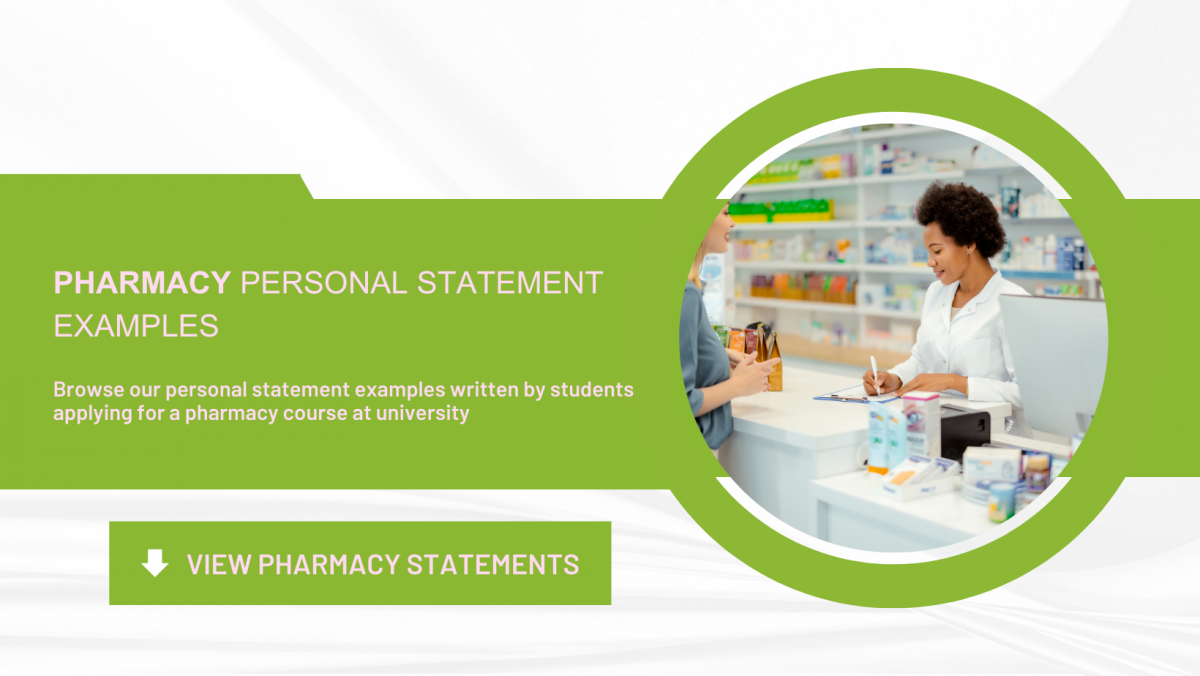
What is a pharmacy personal statement?
Writing a personal statement for pharmacy is a chance to sell yourself to the admissions tutors and show them why you would make a great phramacy candidate.
It’s a place to describe your skills and strengths, as well as your career plans.
You are allowed up to 4,000 characters to explain why you are applying for a pharmacy degree, so you need to make sure your statement is as polished as possible to stand out from the crowd.
How do I write a good pharmacy personal statement?
Good pharmacy personal statements always use evidence to support their claims. You need to convince admissions tutors that you’re a good match for the programme, so if you claim to be committed or inquisitive, then use examples from your life to back it up.
To write a great pharmacy personal statement you need to start early, brainstorm some ideas, and then begin your first draft.
This will then need to be carefully revised and edited before asking family and friends for feedback. Incorporate their comments and suggestions, and see how it is improved before asking them to look at it again.
Read through our pharmacy personal statement examples to give you an idea of what a good pharmacy statement looks like.
Make sure you proofread your statement for grammar and spelling before sending it off, and if you feel you need a little extra help, take a look at our personal statement editing services .
What should I include in my pharmacy personal statement?
Many students choose to start their statement by picking a specific aspect of pharmacy and explaining why they enjoy it, e.g. drug chemistry, cardiovascular and renal systems, etc.
Admissions tutors want candidates that are as passionate about the subject as they are.
As well as your motivations for studying pharmacy, think about your hobbies and extracurricular activities too. What skills have you learned from these and how will these help you in your pharmacy degree?
Talk about any work experience placements you have completed, e.g. shadowing a doctor or nurse, or someone in a similar medical/clinical profession. What did you take away from this experience? Do you feel you have all the necessary personal traits and qualities that make a good pharmacy student?
Your wider reading is also important, so it's worth mentioning anything you've read recently that you found interesting and why. Generally, admissions tutors like students who express their views and opinions, and can back them up with evidence.
For more help and advice on what to write in your pharmacy personal statement, please see:
- Personal Statement Editing Services
- Personal Statement Tips From A Teacher
- Analysis Of A Personal Statement
- The 15th January UCAS Deadline: 4 Ways To Avoid Missing It
- Personal Statement FAQs
- Personal Statement Timeline
- 10 Top Personal Statement Writing Tips
- What To Do If You Miss The 15th January UCAS Deadline.
What can I do with a pharmacy degree?
There are many different career options open to those wishing to study pharmacy at university. These include:
Jobs directly related to your degree include:
- Community pharmacist
- Hospital pharmacist
- Research scientist
Jobs where your degree would be useful include:
- Clinical research associate
- Higher education lecturer
- Medical sales representative
- Medical science liaison
- Pharmacologist
- Product/process development scientist
- Regulatory affairs officer
- Research scientist (life sciences)
- Science writer
- Toxicologist
For more information about careers with a pharamcy degree, please see Prospects and the National Careers Service .
What are the best UK universities for pharmacy?
Currently, the best universities in the UK for studying pharmacy and pharmacology are:
| 1. | |
| 2. | |
| 3. | |
| 4. | |
| 5. | |
| 6. | |
| 7. | |
| 8. | |
| 9. | |
| 10. |
For more information about pharamacology university rankings in the UK, please see The Complete University Guide and SI UK .
Related resources
A level results day.

Find out more
Clearing Guide

Replying To UCAS Offers

Waiting For University Offers

How To Apply To University

8 Personal Statement Mistakes To Avoid

7 University Interview Mistakes

Uni Open Day Tips

The Pharmacist Blog
Personal finance and tips applying to pharmacy school.
How to Get into Pharmacy School
Pharmacy School Personal Statement

Writing has always been a weak point in my abilities throughout my life. I have gradually improved over the years. My writing ability improved dramatically in college when I took English 101 and Technical Writing courses. Honestly, the best way to improve writing ability is practice and read as much as possible. Once I entered Pharmacy School there were few assignments that required writing. Years have passed since my writing prime. I practice by writing these blogs hoping to improve my skills. Thus it is important to keep in mind that writing ability is considered for pharmacy school. Writing ability will be assessed through the PCAT and personal statements. Most of these statements will involve asking why you want to be a pharmacist or how you have overcome a challenge in your life.
Generally you will have to write anywhere from 1-3+ personal statements depending on the pharmacy school application requirements. PharmCAS will require a personal statement and additional personal statements may be required by the pharmacy school’s supplemental application.
I get asked quite often about what to write in the personal statement. All I can say is that you have to decide this for yourself. I do not know why you personally want to be a pharmacist. This is something I cannot possibly answer for you. My advice would be to find the schools you are considering. Keep a list of the personal statement questions and start to brain storm for the next few weeks. A great way to brain storm is to create a map outline of all the information you might want to include in the personal statement. Sit down every night or morning and just start typing away for 30 minutes. Do not worry about the quality at first. You need to get the rough draft down on paper to start editing and improving it.
I spent several months writing my personal statements. I took it to the writing center at my school and had several teacher assistants look over it. I had friends and family read it and my english professors as well. Each revision gave me insight on different styles of writing from each person that read and commented. It was a great learning experience and I highly recommend this route. Over this time period, not only will you learn how to write more effectively, but you will have a polished personal statement to submit to pharmacy schools.
I hope the recommendations above will help guide, motivate, and inspire you to achieve your goals. Follow my blog for more tips and advice on how to become a pharmacist. What are your experiences? Please comment below and share your thoughts.
Subscribe to Blog via Email
Enter your email address to subscribe to this blog and receive notifications of new posts by email.
Email Address
Share this:
ESLDIRECT.COM
ESL Resources for Job Hunters, English Learners, Adult Learners and Tutors
Pharmacy Personal Statement Examples
In this article, we discuss pharmacy personal statement examples and how to write a strong statement for pharmacy school.
Find out how a chemistry set and a mom who was a nurse put one candidate on the path to becoming a pharmacist, and how another candidate learned about patient advocacy in rural Cameroon. We’ll also find out how a potential international student plans to contribute to the community in the USA.
The pharmacy personal statement is one of the most important parts of your application. It’s your chance to show who you are as a person and why you want to study pharmacy.
Your personal statement should be well-written, honest, and specific to you as an individual. To help you get started, we’ve put together some pharmacy personal statement examples below.
Table of Contents
What is a pharmacy personal statement, how to write a strong personal statement for pharmacy school, pharmacy personal statement example 1, pharmacy personal statement example 2, pharmacy personal statement example 3, faq (frequently asked questions), more personal statement tutorials.
It’s a short personal essay written about yourself that is used to help graduate schools decide if you would make a good candidate for their programme.
It explains why you want to pursue pharmacology, any awards or achievements you have received, any relevant work or internship experience, and attributes that make you a good candidate, such as excellent people skills, strong attention to detail, and strong organisational skills.
It can also provide an opportunity to showcase qualities that can’t be easily articulated in words, such as empathy, leadership, and motivation. Ultimately, it can be the deciding factor in your acceptance into a pharmacy programme.
Step 1: Explain your USP (unique selling point)
When writing a personal statement for pharmacy school, it is important to determine your approach – what do you need them to know? What is your USP?
You should consider your motivation for pursuing pharmacy as a career, the experiences that have prepared you for pharmacy school, your personal qualities that make you a strong candidate, and how you fit with the pharmacy school you are applying to.
By reflecting on these factors, you can develop a clear and compelling personal statement that highlights your strengths, experiences, and passion for pharmacy.
As an international student, I am committed to bringing a unique perspective to the classroom and contributing to the cultural diversity of the pharmacy program. I believe that my background and experiences will enable me to connect with patients and colleagues from different cultures and build strong relationships based on mutual respect and understanding. I particularly look forward to volunteering with Spanish speakers in the local community during my time at pharmacy school.
Step 2: Read and reread the institution’s instructions
When writing a pharmacy personal statement, it is important to carefully read and reread the instructions provided by the institution to ensure that you meet all the requirements and guidelines.
Start by reading the instructions thoroughly, taking notes on key points, highlighting important details and asking for clarification if needed.
Make sure to pay attention to what is to be included in your personal statement (for example a key question) and if there is a word limit.
Step 3: Consider getting help from an expert
- Identify potential experts. You can do this by reaching out to your academic advisor, contacting your local pharmacy association, or searching online.
- Reach out to them respectfully
- Provide them with the necessary information such as your academic history, work experience, and goals for pursuing pharmacy.
- Listen to their feedback carefully
- Express your gratitude for their time and expertise.
Remember to be respectful of their time and follow up in a timely manner.
Step 4: Write your personal statement
- Begin by summarising your suitability for the role. Make sure to write from the first-person viewpoint.
- Outline your qualifications and experience, followed by your relevant skills. Be sure to emphasize your enthusiasm for the field of pharmacy and the role you are applying for.
- Keep your personal statement brief and include details relevant to the role.
- Be open and honest in your writing. Being honest in your personal statement will help to prevent any exaggeration or incorrect information.
- Talk about how you solved a problem, really connected with a patient or learned something important relating to pharmacy studies.
- During a placement in Cameroon, I learned to ask the obvious and not so obvious questions. Why were several HIV patients from one village suddenly presenting with stomach ulcers? It turned out that some villagers only ate once a day and without support, could not follow the instructions to take medications twice a day with food. A local NGO helped with training on nutritious plants that were safe to eat, in order to take the second dose of medication. I realised that I want to be the type of pharmacist that goes the extra mile to understand the everyday healthcare challenges in the lives of her patients, and support them where needed.
Step 5: Determine your target audience and message
To determine your target audience and message for your pharmacy personal statement:
- Research the pharmacy program: Learn as much as you can about the pharmacy program you are applying to, including its mission statement, values, and requirements. This will help you to understand what the program is looking for in its applicants.
- Identify the target audience: Consider who will be reading your personal statement, such as admissions officers or faculty members. Think about what they are looking for in an applicant and what they might be interested in hearing from you.
- Consider your message: Think about what you want to convey in your personal statement, such as your passion for pharmacy, your experiences that have prepared you for pharmacy school, and your goals for your pharmacy career. Make sure that your message aligns with the values and mission of the pharmacy program you are applying to.
- Tailor your message to the audience: what are you most interested in learning about? For this candidate, it’s the way in which pharmacists can use new technology.
In particular, I am interested in exploring the ways in which technology can be leveraged to improve patient outcomes and streamline healthcare delivery. During the recent pandemic, apps such as HealthPass made it much safer for more vulnerable patients to participate in daily life. As the healthcare landscape continues to shift towards a more patient-centered, value-based model, I believe that pharmacists must be at the forefront of innovation and change.
Step 6: Keep your personal statement concise and clear
Make sure that each point is concise. Paraphrase and condense the content where possible. Make sure that your final statement does not exceed one page.
The order of your paragraphs must make sense. Make sure your points flow logically and that there is a smooth transition from one point to the next.
Step 7: Share your personal statement with a trusted reviewer
Have an expert review your personal statement. Ask someone you trust to read over your statement and provide feedback on the grammar, structure, and content.
Make any necessary changes. Based on the feedback you receive, adjust your statement to make it stronger.
As a dedicated and passionate student of pharmacy, I am committed to making a difference in the lives of others through my work. I believe that pharmacists have a unique opportunity to improve the health and well-being of patients, and I am eager to contribute to this important field.
My interest in pharmacy began at a young age when I saw first-hand the impact that medications can have on a person’s quality of life. I witnessed my grandmother struggle with a chronic illness, and I was inspired by the role that her pharmacist played in helping to manage her condition. This experience motivated me to pursue a career in pharmacy, and I have been working diligently towards this goal ever since.
Throughout my academic career, I have taken a rigorous course load that has prepared me well for the challenges of pharmacy school. I have excelled in courses such as organic chemistry, biochemistry, and pharmacology, and I have gained practical experience through internships and volunteer work. I am confident that my academic background has prepared me well for the challenging curriculum of pharmacy school, and I am excited to continue my education in this field. In addition to my advocacy experience and academic accomplishments, I possess a number of personal qualities that I believe make me a strong candidate for pharmacy school. I am detail-oriented and meticulous in my work, and I am committed to providing the highest level of care to patients. I am also an excellent communicator, and I believe that effective communication is essential to building strong relationships with patients and healthcare providers.
During a placement in Cameroon, I learned to ask the obvious and not so obvious questions. Why were several HIV patients from one village suddenly presenting with stomach ulcers? It turned out that some villagers only ate once a day and without support, could not follow the instructions to take medications twice a day with food. A local NGO helped with training on nutritious plants that were safe to eat, in order to take the second dose of medication. I realised that I want to be the type of pharmacist that goes the extra mile to understand the everyday healthcare challenges in the lives of her patients and support them where needed.
Ultimately, my goal as a pharmacist is to improve the health and well-being of patients through compassionate care and innovative solutions. I am committed to lifelong learning and professional development as a pharmacy professional, and I am excited to contribute to the dynamic and constantly evolving field of pharmacy. Thank you for considering my application.
As a very young child playing with a $10 chemistry set, I was sure that if I tried hard enough I could mix up a medicine that could save all the sick people in the hospital where my mother worked as a nurse! As a dedicated and motivated student of pharmacy, I am thrilled to have the opportunity to pursue an advanced degree in this exciting and constantly evolving field. Throughout my academic career, I have been driven by a passion for helping others and a deep curiosity about the science of medicine.
I believe that pharmacy is uniquely positioned at the intersection of science and patient care, and I am excited to explore the many ways in which pharmacists can make a difference in the lives of patients. From a young age, I was fascinated by the stories of patients my mother would tell, explaining how medicines had helped them to get better. I realised that as researchers work on developing new drugs and therapies to provide education and counselling to patients, pharmacists play a critical role in improving healthcare outcomes and promoting wellness.
In particular, I am interested in exploring the ways in which technology can be leveraged to improve patient outcomes and streamline healthcare delivery. During the recent pandemic, apps such as HealthPass made it much safer for more vulnerable patients to participate in daily life. As the healthcare landscape continues to shift towards a more patient-centred, value-based model, I believe that pharmacists must be at the forefront of innovation and change.
In pursuing an advanced degree in pharmacy, I am excited to collaborate with other healthcare professionals and experts in the field to explore new solutions and approaches. I am eager to learn from experienced professionals, conduct research, and apply my knowledge and skills to real-world challenges to make a meaningful impact on the health and well-being of patients and the ongoing evolution and growth of the field. I am so excited to embark on this exciting new chapter in my academic and professional journey.
As an international student, I am excited to have the opportunity to pursue a degree in pharmacy in the USA. I am drawn to the USA’s reputation for excellence in healthcare and its innovative approach to pharmacy education.
My passion for pharmacy began in my home country, where the numbers of hospitals and doctors per capita are very low and most people would go to a pharmacy rather to a private doctor. I can see the critical role that pharmacists play in promoting wellness and managing chronic conditions. In Mexico, the obesity crisis means that around 14 million adults are living with diabetes, a rise of about 10% in the last few years. This number includes eight of my relatives and without supportive, empathetic pharmacists, I believe that some of my family members would not have survived. As a biology major for my undergraduate degree, I am eager to build on the foundation and gain a deeper understanding of the science of medicine, as well as the complex healthcare systems that underpin patient care.
I am confident that studying pharmacy in the USA will provide me with the knowledge, skills, and experience I need to excel in this challenging and rewarding field. I am particularly excited about the opportunities for hands-on learning and practical experience, as well as the chance to collaborate with other students and professionals from diverse backgrounds.
My goal as a pharmacist is to make a meaningful difference in the lives of patients and to contribute to the ongoing advancement of healthcare in my home country and beyond. I am confident that studying pharmacy in the USA will provide me with the knowledge, skills, and networks I need to achieve this goal, and I am excited to embark on this exciting new chapter in my academic and professional journey.
Some of these questions were already covered in this blog post but I will still list them here (because not everyone carefully reads every paragraph) so here’s the TL;DR version.
What are the essential components of a strong pharmacy personal statement?
A strong pharmacy personal statement should include:
- an introduction
- knowledge and interest in pharmacy
- work or voluntary experience, hobbies and interests
- why you want to pursue pharmacy
- what about that particular university’s programme appeals to you
- any achievements or awards you’ve received
- any relevant internships or work experience
- why you’d make a good candidate
- qualities such as excellent people skills, strong attention to detail, honesty and integrity, and good communication skills.
What qualifications do I need to apply to a pharmacy school program?
In order to apply to a pharmacy school program, you need to have a foundational degree in the field of pharmacy.
A pharmacy degree program in the United States usually involves at least 2 years of specific undergraduate coursework followed by 3-4 years of professional study.
Finally, it’s important to note that depending on the particular university you plan on attending, there may be some additional institutional requirements. These will be listed on the university’s website and/or in the admissions packet for the school.
How do I demonstrate my enthusiasm for a career in pharmacy?
Below are a few tips to help you demonstrate enthusiasm for a career in pharmacy including some examples.
Describe any relevant work experience you have gained in local pharmacies.
This work experience has helped me gain a better understanding of how pharmacies work, as well as how to build trust in dealing with customers. I have also demonstrated empathy, active listening, and confidence in customer interactions.
Discuss the knowledge you have gained from working in different pharmacies.
Through my work in different pharmacies, I have developed an understanding of over-the-counter and prescription medications, treatments, relief, and side effects for common conditions including asthma, diabetes, and hypertension.
Showcase your commitment to learning and development.
I have taken part in self-directed learning to stay abreast of the dynamic field of pharmaceuticals. Through workshops, conferences, and courses, I have learned more about natural treatments, the human body, medicine, and recovery.
How can I demonstrate my suitability for a pharmacy degree programme?
- Academic preparation: Show that you have the necessary academic preparation for a pharmacy degree programme by highlighting your performance in relevant courses, such as biology, chemistry, and mathematics.
- Relevant experiences : Highlight any relevant experiences that demonstrate your interest in pharmacy, such as work or volunteer experience in a pharmacy or healthcare setting.
- Personal qualities: Emphasize the personal qualities that make you a good fit for a pharmacy degree programme. This can include qualities such as attention to detail, strong teamwork and communication skills, the ability to work well under pressure, and a commitment to patient care.
- Career goals : Discuss your career goals and how a pharmacy degree will help you achieve them. Show that you have a clear understanding of the profession and how you see yourself contributing to the field in the future
- Community involvement : Discuss any involvement in your community, such as volunteering at a hospital, patient advocacy or participating in community health initiatives. This can help to demonstrate your commitment to making a positive impact in the lives of others.
What information is required in the body paragraphs of a pharmacy personal statement?
The applicant’s knowledge and interest in pharmacy, work or volunteer experience, and hobbies and interests.
The applicant’s values, goals, and motivations for wanting to pursue a career in pharmacy.
Any relevant awards, certifications, or other accomplishments that set them apart from other applicants.
The applicant’s unique qualities, such as enthusiasm and dedication, will benefit the pharmacy program.
How can I demonstrate my knowledge of the healthcare profession and pharmacology?
- Research extensively on pharmacology and the healthcare profession, including current trends and related topics.
- Organise work experience at pharmacies, paying close attention to how pharmacists interact with customers and handle various prescription drugs.
- Take a course related to the healthcare profession and pharmacology.
- Volunteer with charities or organizations that are related to the healthcare profession, such as Oxfam.
What types of work experience placements are appropriate for pharmacy school applications?
These placements can be found in both the public and private sectors.
In the public sector, pharmacy placements may be available in hospitals and healthcare facilities. Placements may involve assisting with the dispensing of medications, managing the inventory of medications, and providing customer service to patients.
In the private sector, placements may be available in retail stores such as supermarkets and drug stores. Placements may involve managing the inventory of medications, providing customer service to customers, and assisting with the dispensing of medications.
Additionally, placements may be available in pharmaceutical companies. Placements may involve assisting with research and development, managing the inventory of medications, and providing customer service to customers.
How do I make sure my pharmacy personal statement is free of spelling and grammar errors?
To make sure your personal statement is free of spelling and grammar errors, it is important to follow these steps:
- Start writing your pharmacy personal statement as early as possible. This gives you the time to brainstorm some ideas, and then begin your first draft.
- After writing your first draft, carefully revise and edit it first. Then, ask classmates or an academic advisor for feedback and incorporate their comments and suggestions.
- Hire a professional editor to proofread your writing or use a do-it-yourself tool like Grammarly to check for any grammar and spelling mistakes.
- Finally, make sure that your pharmacy personal statement is just on or below the required word count.
- Personal Statement versus Statement of Purpose
- How to Write a Winning Scholarship Personal Statement: With Examples
- Residency Personal Statement Examples: Top Tips for Best Length, Content, and Structure
- Statement of Purpose Examples: How to Write the Best One for You?
- Nursing Personal Statement Examples in 2023
- How to write a Resume Personal Statement That Gets You the Job – with Examples and Tips
- How to Write a Personal Statement for Psychology: With Helpful Tips and Examples
- How to Write a Personal Statement for Engineering: Examples and Advice
- Best Internal Medicine Personal Statement Examples For Residency
- MBA Personal Statement Examples for Graduate Applicants
- Law Personal Statement Examples to Help With Your Law School Application
- How to Write a Personal Statement for Criminology: With Helpful Examples
- Pharmacy School
Pharmacy Personal Statement UCAS
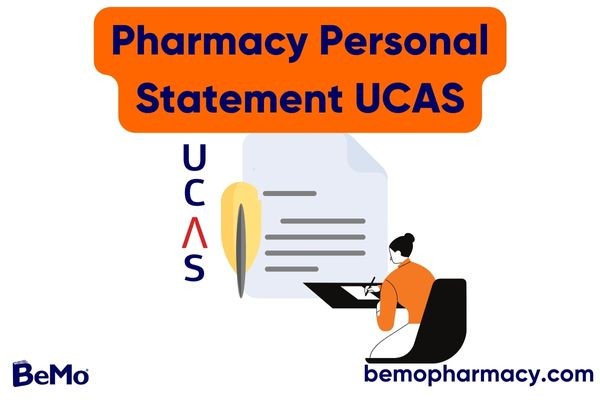
Looking to craft the very best pharmacy personal statement in UCAS will require you to deliver a top-quality statement in very few words. This is a major challenge, and one which can cause a lot of consternation for anyone attempting it. You are essentially answering, “ why do you want to be a pharmacist ,” as part of your personal story. But how can you effectively write an essay on that subject in the middle of your pharmacy school planning ?
In this article, we provide great examples of UCAS pharmacy personal statements, as well as general tips for writing your personal statement.
>> Want us to help you get accepted? Schedule a free initial consultation here <<
Article Contents 10 min read
Ucas pharmacy personal statement examples, ucas pharmacy personal statement example no.1.
My father’s wristwatch lay spread out on the table in front of me in what seemed like a thousand pieces, every part in order and ready to be returned to its casing. The casing looked too small, but it wasn’t the size, it was really the complexity that grabbed me.
I love complex systems, and as I watched my father, the jeweller, reassemble his timepiece, I knew that I would be involved with complexity throughout my life. I thought of my father’s watch in my mathematics class when I was trying to solve more and more complicated problems involving formulae; I could always visualise them like that disassembled watch. It really felt like I was stripping numbers down to their component elements and putting them back together.
I used this knowledge to help other students understand mathematics when I worked as a tutor and then as a TA. I was able to explain my strategies for visualising complex systems to help my students in their own studies. One student had struggled with math his whole life but discovered a love for them once I had him visualising the numbers as components and gears and pieces. Watching his grades go from lower-middle to lower-high was very rewarding.
My favourite place to apply my mathematics knowledge was in chemistry, and particularly in the laboratory, which I always found to be a wonderful challenge. This often felt like a puzzle as well, and success in the lab seemed to me to be wholly dependent on knowing how to put everything in just the right order; otherwise, like all of those glittering watch pieces, it wouldn’t fit or work properly. My best work in the lab was in several experiments we conducted to learn more about DNA. Even late at night when others had quit, I was still plugging away, trying to “reassemble the watch.” This hard work has paid off with the scholarship money I received thanks to those very experiments on DNA.
I knew that I wanted to take my knowledge and serve people, to make their lives better, and I have always had a lot of contact with our local pharmacist. My brother has been on medications his whole life, and they must be constantly reassessed to make sure he is still deriving benefits from his treatment. Ever since I was young, I have appreciated the precision and care with which a pharmacist creates medicine and heals sick people. This seemed to me like the best place to apply my skills.
My first taste of helping people in this capacity was in a job as a kind of medication delivery boy: I used to drive around my hometown, bringing medications from the pharmacy to sick people. This became even more vital at a time when people often couldn’t leave the house to pick up their own medications. It was an obvious plus to have someone who was willing to build on their knowledge of medications, as I was.
Since that time, I have known pharmacy was the right job for me. I’ll still “deliver” medication, albeit by making the medication instead of driving around in my used car. I will be happy to advance the application of my skills.
I know this is the perfect place for me because I can help people like my brother, which is an honour and a privilege, while doing what I love: developing complex solutions to big problems. My watchmaker father would have loved to watch me in the lab, working to my full potential, using my unique skills, and helping to get people the medications they need to live. It would make him proud. Knowing what I want to do in life and how to do it, it’s like seeing all those glittering components, spread out on the table.
Several years ago, my sister Flora almost died right at the beginning of our summer vacation. She was in a very bad collision with another vehicle on the road and required a series of extensive surgeries to give her back the full use of her body. Throughout this process, I cannot stress enough how necessary it was to have the right medications so that Flora could manage her pain. Those medications saved her life, along with the surgeries, and what made this all the better was how friendly and concerned the pharmacist was during our family’s hardships.
It’s this experience that made me want to become a pharmacist, so that I, too, could make people well again, all with a smile and a kind word. While providing treatment and supplying them with knowledge about their medication’s use, I also want people to feel cared for, as my sister was. Therefore, with my goal set – to become a pharmacist – I set out along two paths to achieve this end: increasing my scientific knowledge and growing my ability to care for clients.
The first path was informed most by my chemistry class. Given my sister’s experience, I wanted to understand the cutting edge of pain management. To that end, I enthusiastically joined a research team for a study on pain medications, comparing modern medicine with more traditional cures. Through this study, I found myself engaged in every aspect of laboratory work, but I most enjoyed identifying the similarities and differences between different medications. We found extremely interesting links between our modern medications and other, older types of healing.
While the study is unlikely to completely change our views – we won’t be replacing acetaminophen with an herbal cocktail anytime soon – we are being reminded that chemistry and biology are the basis for all cures, modern and ancient. Every medication uses natural ingredients at some point, and it is good to remember the history of one’s chosen profession. The study is ongoing, but the research is yielding very interesting results, which we are hopeful will inform pain management in the coming years. Furthermore, my curiosity and scientific knowledge of medications has been greatly boosted by this work.
As for my second path, I began volunteering at a medical clinic and set myself the challenge of remembering every patient’s name at the end of each day. This proved to be quite the high bar, and I didn’t always remember each person. However, I did find that, as time went on, I got better at recollecting faces and names, and I remembered several who came in on multiple occasions.
To some people, I’m barely a kid, but I don’t feel that way. Losing a friend to drug abuse will do that. I had to grow up really fast in secondary school when my buddy Rod began to deteriorate. His loss is still something that I mourn and wish I could have helped prevent.
What started Rod’s downturn was abuse of prescription medication. That might seem like a strange way to talk for a future pharmacist, but the fact of the matter is that I aim to be a person who prevents the kind of disease and death that claimed my friend.
My experiences are a cautionary tale. They inform my studies because I know the kind of power that medication has. I know first-hand the concrete truth of what can happen if a pharmacist were to get medications wrong, explain their use poorly to a client, or be negligent in their duties. While no pharmacist was to blame for Rod, I still think about what happened to him in relation to who I want to be.
I have been volunteering with a youth program that helps keep teens off drugs and helps them get off drugs when they develop addiction. We work preventatively by raising awareness of the potential hazards of prescription medication. This has made me more conscientious about medications myself, and I’ve seen the benefit in my local community.
In addition, my experience shadowing a pharmacist, Troy Noble, informed my own studies in the chemistry lab while enabling me to learn about the day-to-day work of a pharmacist. This confirmed for me the practical ways that a pharmacist can interact with their clients to ensure safe medication use.
I asked Mr. Noble about prevention, and he said that clients are screened by doctors, but he gave me some good information about how to spot somebody who might be drug-seeking and who has slipped through the system. He also talked about how to minimise risk by being precise with medications and with proper paperwork. A lot of people think of pharmacy as being about the medications themselves, but I have become familiar with the systems pharmacists use to keep track of data so that mistakes don’t happen – mistakes which could have dire consequences.
After shadowing Mr. Noble, I got in some hours interning for him, mostly performing that same paperwork – since I was not qualified to dispense medications yet. I was also allowed to sit in with him on some client interactions, with their permission, to observe the clear, effective methods of communication used to make sure clients understand how to use their medications for best effects and with minimal risk of harmful side effects. Mr. Noble was even kind enough to allow me to practise client interactions with himself acting as the client.
Over the past several years, I have learned a lot, through the youth program, and through my interning and shadowing with Mr. Noble. I hope to take all I have learned, all my growth and experiences, and dedicate myself to helping with health care, as well as preventing the tragic loss of life. My practice will be for everybody like Rod who needs help and guidance.
How Should I Format My UCAS Pharmacy Personal Statement?
The thing you need to keep in mind for the UCAS pharmacy personal statement is that it is limited to 4,000 characters in length. While the exact word count will vary, 4,000 characters will only give you about 700 words on average, so you need to be precise and efficient in your language. Word counts are fixed and include spaces. Don’t exceed the limit under any circumstances. If you cross that boundary, you need to rewrite your statement to fit the spaces provided.
The personal statement helps your application by introducing you to any universities and colleges, or in this case, pharmacy schools, you are applying to through the UCAS system. This introduction is more personal than your transcript. It is not just information about how you performed on tests but provides insight into your character and who you are as a person.
Why is that important? It gives admissions committees a more complete portrait of who you are. It illuminates your personal views. Most importantly, it presents a kind of argument as to why you should be admitted to their school. Other information on your application will be universal – everybody has grades, for instance – but the personal statement is, as the name indicates, personal. Therein lies the importance of the personal statement – because if you can present yourself as a unique candidate, you’ll stand out.
Furthermore, admissions committees want to see a person who is ideally suited for pharmacy school. What traits will they be looking for?
- Experience in medicine, chemistry, or with the technical skills and knowledge required for pharmacy school. You don’t need to know everything there is to know about pharmacy, but if you have experience with mathematics, chemistry, or other related areas of expertise, this will come in handy.
- Understanding of what it means to be a pharmacist. If you spend your entire personal statement talking about how you want to heal sick people, the admissions committee might think, “Why doesn’t this person want to be a doctor or nurse?” When you talk about what makes you want to be a pharmacist, highlight the specific reasons unique to you and to the position.
- Personability. The ability to work well with others, to be empathic, to lead, and to teach – any interpersonal capability, really – are invaluable to pharmacists. Everybody benefits from having a student or pharmacist who knows how to communicate and create a friendly atmosphere at work.
- Curiosity and a willingness to learn. A curious student is a great student, and somebody who is looking forward to a lifetime of learning and personal growth is an enviable find for any university or college.
You don’t need to have extensive examples which demonstrate all four of those traits, but you should take any opportunity that you can to showcase them for the admissions committee.
The first step to completing your pharmacy personal statement for UCAS is looking up tips and advice. Experts can give you the edge you’re looking for to take your personal statement from good to excellent. Make sure to take advantage of all the opportunities you can to help you with your personal statement.
Now that you have perused this list of expert tips and carefully considered the examples presented, you’re ready to write a top-notch personal statement for your pharmacy application. Soon enough, you’ll be into pharmacy school interview preparation with pharmacy interview questions .
The Universities and Colleges Admissions Service is a charitable organisation that handles application processes for British universities and colleges.
UCAS allows you to apply to up to five schools.
Yes. Although you won’t formally receive marks or a grade, you are presenting yourself and you want to appear in the best light possible. To that end, consider spelling and grammar to be essential elements of showcasing yourself as an ideal student.
Your personal statement won’t be considered if you haven’t bothered to follow the rules of UCAS. So, if you exceed the word count, what happens is that you’ll rewrite your essay.
Working through writer’s block is about giving yourself ideas. One exercise you can try is to give yourself a blank sheet of paper and one or two minutes to free-associate just thinking about your interests, or about why you want to be a pharmacist. You’ll almost certainly come up with some ideas that you can grow into a good personal statement.
Spend some time on it. Coming up with a personal statement should be done over time to give yourself the room to write, edit, rewrite, and proofread your essay. You will probably want to show it to somebody else, too, or seek out professional essay writing services for assistance.
Anything already covered in your transcripts. Don’t make your personal statement just a list of accomplishments. Avoid talking about too many subjects – focus is required. Of course, you also want to avoid anything that might appear to be a problem – particularly without explanation.
No. You would have to contact the university or college you applied to directly to see if they’ll take an updated version. Write your personal statement elsewhere before uploading it. Also write it in a plain text document to avoid formatting errors.
Want more free tips? Subscribe to our channels for more free and useful content!
Apple Podcasts
Like our blog? Write for us ! >>
Have a question ask our admissions experts below and we'll answer your questions, get started now.
Talk to one of our admissions experts
Our site uses cookies. By using our website, you agree with our cookie policy .
FREE Training Webclass:
How to make your pharmacy application stand out, (and avoid the top 5 mistakes that get most rejected).
- Personal statement advice: pharmacy
Applying to university
- Getting started
- UCAS Tariff points
- Calculate your UCAS Tariff points
- Amendments to the Tariff consultation
- Offer rate calculator
- How to use the offer rate calculator
- Understanding historical entry grades data
- Admissions tests
- Deferred entry
- Personal statement advice and example: computer science
- Personal statement advice: English
- Personal statement advice: Midwifery
- Personal statement advice: animal science
- Personal statement advice: biology
- Personal statement advice: business and management
- Personal statement advice: chemistry
- Personal statement advice: dance
- Personal statement advice: dentistry
- Personal statement advice: drama
- Personal statement advice: economics
- Personal statement advice: engineering
- Personal statement advice: geography
- Personal statement advice: history
- Personal statement advice: law
- Personal statement advice: maths
- Personal statement advice: media studies and journalism
- Personal statement advice: medicine
- Personal statement advice: modern languages
- Personal statement advice: music
- Personal statement advice: nursing
- Personal statement advice: physiotherapy
- Personal statement advice: politics
- Personal statement advice: psychology
- Personal statement advice: social work
- Personal statement advice: sociology
- Personal statement advice: sports science
- Personal statement advice: statistics
- Personal statement advice: teacher training and education
- Personal statement advice: veterinary medicine
- Personal statement: finance and accounting
- Filling in your application
- Staying safe online
- How to write a personal statement that works for multiple courses
- How To Write Your Undergraduate Personal Statement
- Fraud and similarity
- How to start a personal statement: The attention grabber
- How to end your personal statement
- Introducing the personal statement tool
- Personal statement dos and don'ts
- What to include in a personal statement
- Using AI and ChatGPT to help you with your personal statement
- Using your personal statement beyond a university application
- Carers, estranged students, refugees, asylum seekers, and those with limited leave to remain
- Personal statement guides
- References for mature students
Research pharmacy as a subject
Standing out from the crowd when it comes to your pharmacy personal statement means doing your research and really demonstrating your suitability, commitment, and enthusiasm in a convincing way.
It’s a professional course you’re applying for here, and it’s essential that you’ve gained an insight into the profession itself, ideally through a combination of background reading and, if possible, some personal experience too – even if it was just talking to a pharmacist, or learning about it through visits to university open days or relevant events.
Use your statement to reflect on:
- your perceptions of what the profession is about, and where you can see yourself within it
- the skills and qualities that will be required, both to study pharmacy and to practice it as a profession
- evidence of situations or activities where you’ve displayed some of these skills and qualities yourself
If you can express all this in what the University of Manchester calls 'a creative statement that demonstrates enthusiasm and commitment for the subject,' then, provided you’ve got what it takes academically, you should be in with a good chance of success.
What unis are looking for in pharmacy students
Interpersonal skills: 'Being a good pharmacist involves more than academic excellence. You need to be good at interacting and communicating well with people from diverse backgrounds. Anything that demonstrates this ability looks good in your personal statement,' according to Dr Karen Ball, principal lecturer and admissions tutor at the School of Pharmacy and Biomedical Sciences at University of Portsmouth.
Understanding of the profession: tutors at University of Bath expect you to demonstrate:
- your enthusiasm and interest in pharmacy
- evidence of your understanding of the role of a pharmacist
This doesn’t mean telling them what a pharmacist does, but reflecting on what you’ve found out for yourself through your research and any relevant visits, volunteering, or work experience. What did you learn and how might you apply this knowledge to your future study?
Awareness of the skills you'll need: on its website, Aston University offers some examples of how the emphasis of a pharmacist's role has changed, and mentions some of the key skills for which you might want to show evidence in your statement. That's the kind of information you'll be expected to know.
Your wider reading: University of Reading reinforces that the best way to stand out from the crowd is through the way you explain what interests you about pharmacy, your comments on the relevant reading and research you’ve done, and/or the experience you’ve had.
Commitment to the profession: Cardiff University’s selectors are looking for evidence of this and will assess your suitability by the way you demonstrate and evidence your 'knowledge of the science and practice of pharmacy' through your 'background reading or work experience.'
Clear language: this is a field where clarity and accuracy are essential, so reflect this in the way you approach your personal statement. It needs to be logical and easy to understand. Don’t try to stand out by being too flash or overcomplicated.
Relevant work experience: admissions tutors at Keele University are keen to hear about any relevant experience, what you feel you’ve gained from it, and how it has helped you to understand more about what your future career in pharmacy might involve. See our guide to making your work experience count for tips on how to do this.
Relevant skills: reflect on any relevant skills you’ve gained in academic, social, or work settings, whether it’s teamwork, communication, leadership, caring for others, or how you balance work with relaxation. But don’t exaggerate this. Be mindful that tutors will also read your reference to see if it fits with what you’ve said about yourself in the statement.
Medicine/dentistry applicants: is it ok to put pharmacy down as a fifth choice?
Sponsored articles ucas media service, do you need to take an english test to study at university in the uk, five reasons to sign up to the ucas newsletter, ntu priority: jump the clearing queue.
Home > Pharmacy > Personal statement

Personal statement
Note: UCAS is reforming personal statements for applications made in 2025 (2026 entry) and the current format will be replaced with a series of free-text questions. More detail will be added to this page when it is available. This does not affect applications submitted in 2024.
Many students get very concerned about what to write in their personal statement. The most important thing is that it is written by you, it reflects you as a person, and is an honest reflection of your thoughts, skills and interests.
What to write about
The personal statement is your opportunity to articulate why you would like to study pharmacy, and explain what skills and experience you possess which would make you a good pharmacist.
Remember that your personal statement should be individual to you. The personal statement is the same for each course you apply for, so avoid mentioning any universities or colleges by name.
In your personal statement, you should:
- Tell the reader why you are applying – include your motivation to study pharmacy, as well as what interests you about the subject
- Explain what makes you suitable for a career in pharmacy – this could be relevant experience, skills, or achievements you have gained from education, work, or other activities
- Talk about any current affairs in pharmacy or healthcare which you have heard about, explaining what you found interesting and why
- Mention any other pharmacy or science related outreach activities you may have attended, explaining what you found interesting and why
- Include some information about what you like to do in your spare time and how this has developed your skills
- If there are any personal circumstances which have affected your educational performance or qualification choices, outline them in your personal statement. For example, this might be something that caused you to miss school, such as a physical or mental health condition, or caring for a family member.
Core values and attributes of a pharmacist
A good pharmacist is more than someone with the right qualifications and grades. Pharmacists need to have good problem solving and communication skills, be able to manage complexity, and possess a strong attention to detail when optimising patients’ medicines. They must be a professional – someone who collaborates with others, takes a leadership role in patient advocacy, and who possesses integrity. The personal statement is therefore an important part of the application process, as it gives you the opportunity to give a rounded sense of yourself as an individual.
Skills and attributes of an ideal candidate to pharmacy
- Motivation to study pharmacy and genuine interest in the profession
- Effective communication, including reading, writing, listening and speaking
- Ability to work in a team
- Personal organisation
- Academic ability with an interest in science
- Responsibility
- Professionalism
- Attention to detail and be analytical
- Some work experience in a pharmacy or patient/public facing setting
Reflect on your experiences
The most important thing about your personal statement is that it is written by you and that it is an honest reflection of your thoughts, skills and interests. When writing your personal statement, keep these core skills and attributes in mind. Rather than simply stating that you embody these attributes, give examples of how you have demonstrated them in the past, for instance, through extracurricular activities.
How are personal statements used?
Pharmacy schools vary in how they assess personal statements. Some score them while others do not. The personal statement is often used as a basis for conversation at interview, so it is a good idea to write about experiences which you would be prepared to expand on if asked.

Test yourself
Write a list of everything you would want a pharmacy school to know about you – your achievements, talents, experiences and personal qualities. To help you structure your personal statement, allocate each element in your list to one of the following areas:
Introduction
Knowledge and interest in pharmacy
Work or voluntary experience
Hobbies and interests
You should now be able to develop a first draft of your personal statement.
10+ SAMPLE Pharmacy School Personal Statement in PDF
Pharmacy school personal statement, 10+ sample pharmacy school personal statement, what is a pharmacy school personal statement, do’s and don’ts in pharmacy school personal statement, tips on pharmacy school personal statement, how to write a pharmacy school personal statement, how many characters is a pharmacy school personal statement, do all universities require a pharmacy school personal statement.
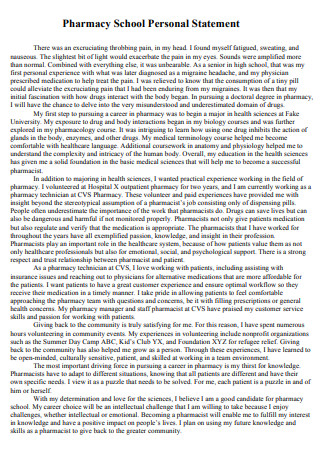
Medical School Personal Statement
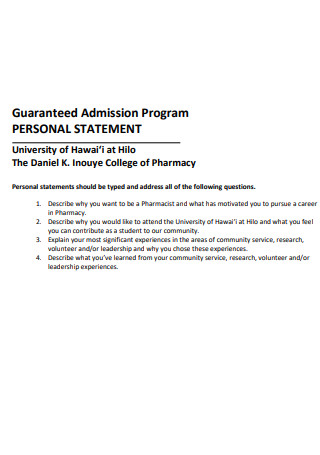
Pharmacy College Personal Statement
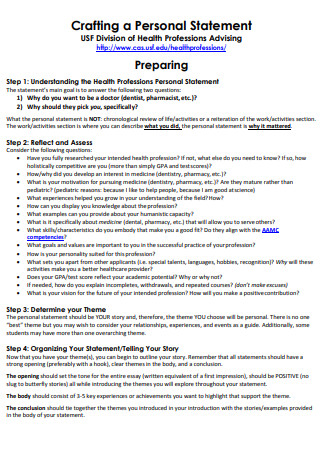
Health Profession Personal Statement
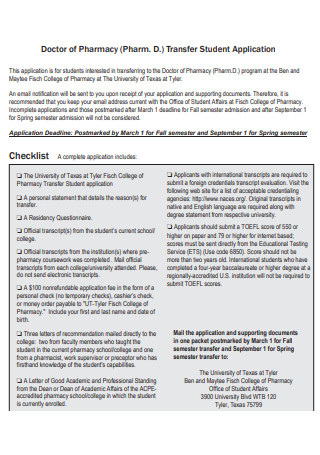
Pharmacy Doctor Personal Statement
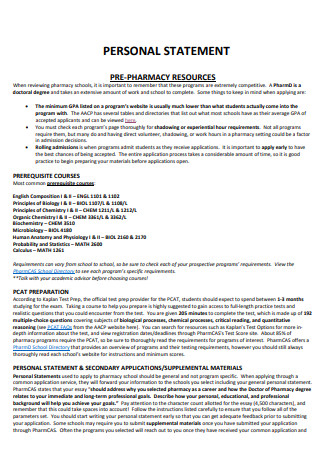
Pre-Pharmacy School Personal Statement
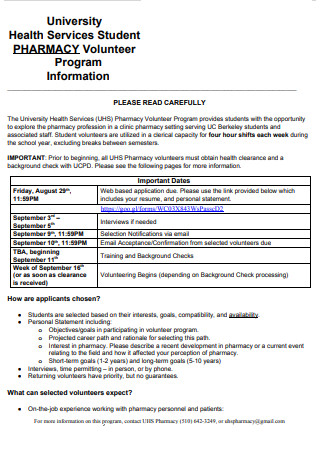
Pharmacy Student Volunteer Personal Statement
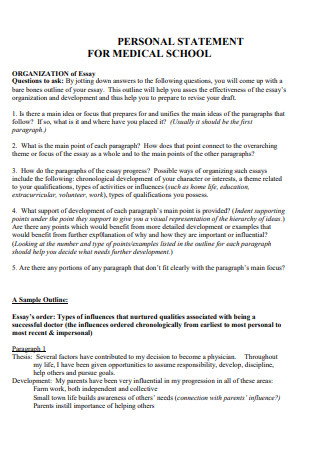
Medical School Essay Personal Statement
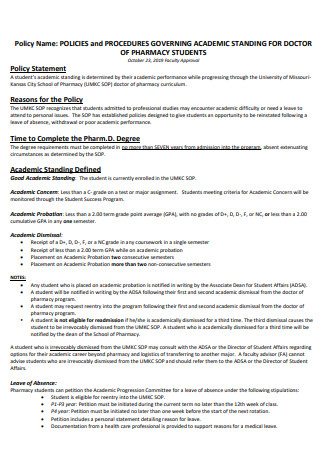
Pharmacy Student Personal Policy Statement
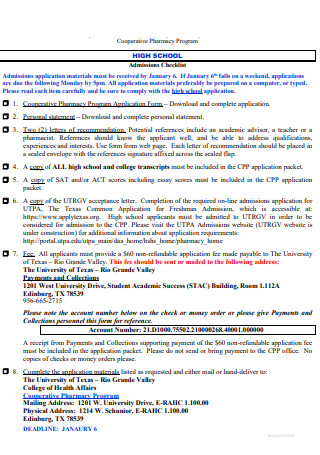
Pharmacy School Program Personal Statement
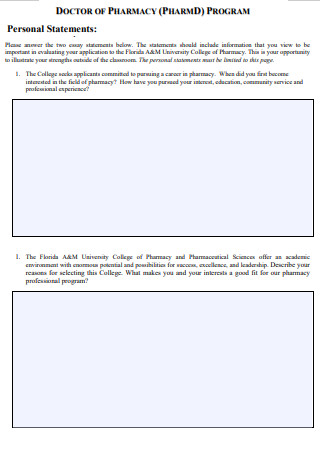
Pharmacy University Personal Statement
- You should start early in creating the pharmacy school personal statement. Start a month before you are going to submit your application. You should plan ahead so that you will create the best pharmacy school personal statement. Planning can make you create a polished statement. You can include all the good things that you can think of.
- Use the right grammar and punctuation. Remember, if your grammar will not be good, your statement might get rejected. Right grammar and punctuation are important to not spoil your statement. If someone is reading your statement and they will notice some grammatical errors , they will be disappointed with your statement even how good it is. So, be sure that you are going to use the right grammar and punctuation.
- Make a good structure for your statement. Your statement should have a good format so that it can catch the attention of your readers. Remember, your writing should be neat. You can only do this if you can find a good format for your statement. So, research for the best pharmacy school personal statement format . Use something that can make your statement attractive.
- Make the reader know who you are. This will mean that you have to reveal your emotions. You have to tell your story to the readers. Do not be afraid to do this. The university should have an idea of your character. You can have the pharmacy school personal statement as your monologue. Reveal to them who you are. Through this, the admissions officers can have a heart for you.
- Show that you have a good commitment to everything that you will do. Show them that you are capable of finishing college. If they can see that you can be committed to what you do, they will know that you can be a good student. Someone who can finish college. Then, they will not waste the slot that can be given to you if they will accept you into college.
- Make the reader relate to your story. You must share your experiences that can show that you can be qualified for the course. Share your past activities where you have excelled. You should tell the admissions officer how you hope to progress in your desired field. Share one unique story about you that will show that you are apt to be a pharmacy student.
- You should organize your essay . Avoid anything that will make the readers confused. So, be sure to organize every sentence in your essay. Be clear in covering each topic. Write concisely so that the readers will understand everything that you have to say. Your sentences should have a smooth flow. Avoid everything that will make your sentences obscure.
- Proofread your work five times. This is not too much. You need to ensure that your statement has no grammatical errors. You have to ensure that it will be perfect. Read your statement five times to ensure that it has a good structure. Do not stop until you can see that your work is perfect. Remember, you will only have your application one time. So, you have to perfect everything.
Don’ts
- Do not include your transcript in the personal statement. Remember, they can look at it anytime because you will include it in your college application . You do not have to repeat the content of your personal statement.
- Do not stray from your topics. When you have a topic to say, be sure that you will be specific and direct. Do not stray from what you are explaining. Your words will be meaningless if you stray from the topics. You will just make your readers confused with your statement.
- Do not include unnecessary information in your statement. Do not use filler or fluff. Do not do this just for the sake that your personal statement will be longer. You will waste your time if you do this. Your statement can be rejected because of this. Fluff and filler are highly frowned upon. So, do not do this if you want your statement to be meaningful.
- You should not rush yourself in writing. You can give yourself several months to be sure that you can plan for your statement. After completion, you can revisit your essay to be sure that it is good enough. Read your statement again after each week. This way, you can add something that can make it better.
- You should not include irrelevant things in your statement. For example, you should not include your academic successes that are not related to pharmacy. You must focus on things about pharmacy only.
- You should prevent hyperbole or plagiarism in your work. Do not use the work of others. Remember that it is a personal statement. Everything should be on your own only.
- Do not include controversial topics. They are irrelevant to your statement. You will just be wasting time and space by including those things. They will not do good to your statement.
- You should not include emotional experiences in your statement. If you know that you cannot discuss something that you will write in the interview, do not write it. You do not have to discuss emotional experiences with the university.
- You should not make excuses about anything. If you have to defend something, be sure that you are not going to make an excuse for it. The admissions committee will not like excuses.
- You should not apologize for past mistakes. If you have an underachievement, you do not have to apologize for it. You should not appear to be regretful
- You should not talk about money. You will look bad if you talk about money.
- Do not underestimate the pharmaceutical profession. You have to know that this profession is stressful. Do not think that it is an easy career.
Step 1: Make Preparation
Step 2: write a personal introduction, step 3: choose the best structure, step 4: connect with your readers, step 5: share your pharmacy-related achievements, share this post on your network, you may also like these articles, bank statement.
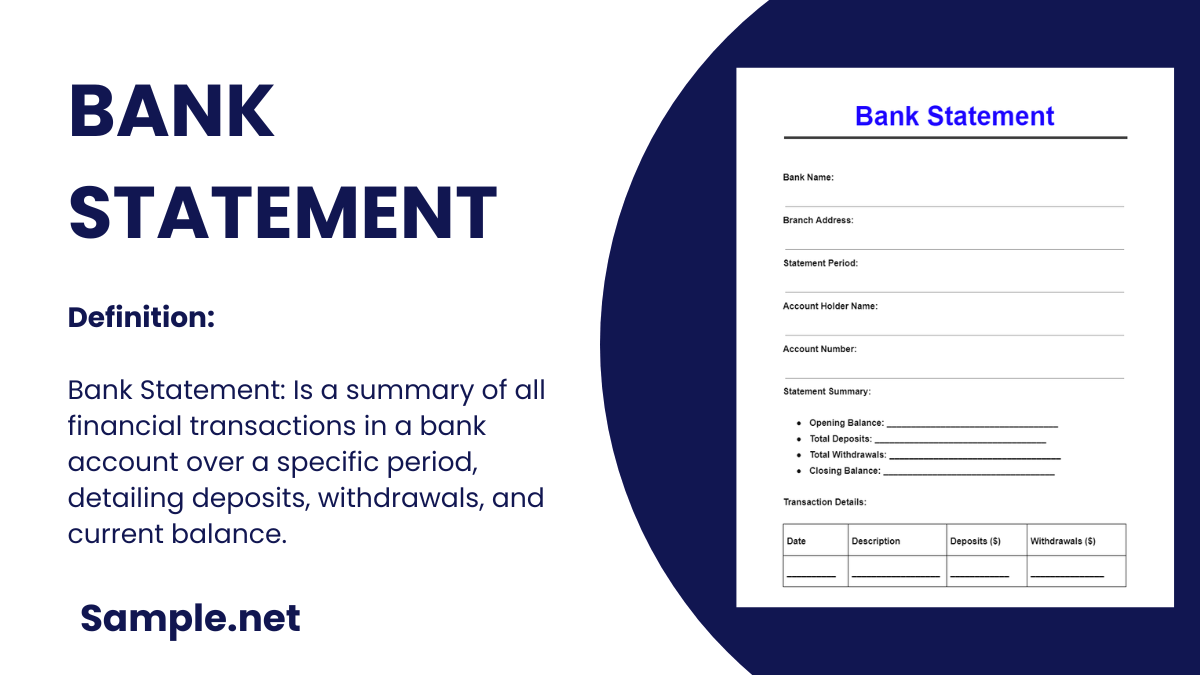
A Bank Statement is a crucial document that provides a summary of your banking activity over a specific period. It includes deposits, withdrawals, transfers, and the current balance. Understanding…
Research Problem Statement
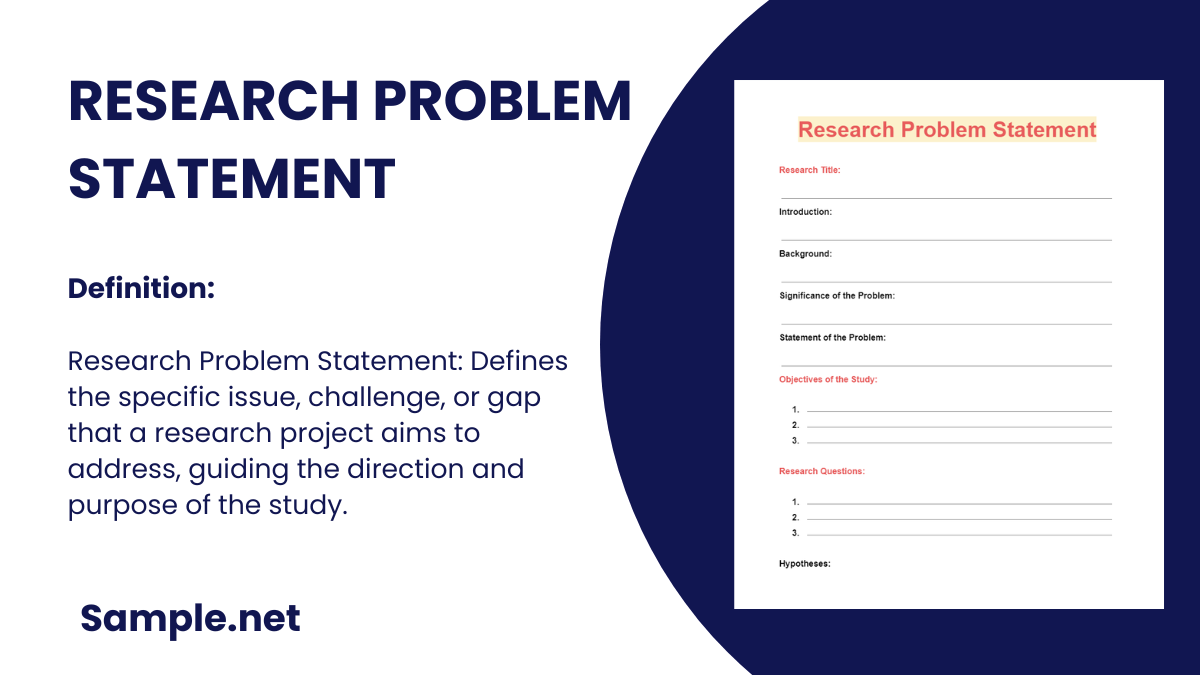
Creating a clear and compelling Research Problem Statement is essential for any successful research project. This guide provides a step-by-step approach to formulating an effective problem statement, including key…
browse by categories
- Questionnaire
- Description
- Reconciliation
- Certificate
- Spreadsheet
Information
- privacy policy
- Terms & Conditions
- Ask a question Ask
- go advanced Search
- Please enter a title
- Please enter a message
- Your discussion will live here... (Start typing, we will pick a forum for you) Please select a forum Change forum View more forums... View less forums... GCSEs A-levels Applications, Clearing and UCAS University Life Student Finance England Part-time and temporary employment Chat Everyday issues Friends, family and work Relationships Health News Student Surveys and Research
- post anonymously
- All study help
- Uni applications
- University and HE colleges
- University help and courses
- University student life
Postgraduate
- Careers and jobs
- Teacher training
- Finance and accountancy
- Relationships
- Sexual health
- Give feedback or report a problem
- University and university courses
- Universities and HE colleges
- Life and style
- Entertainment
- Debate and current affairs
- Careers and Jobs
- Scottish qualifications
- Foreign languages
- GCSE articles
- A-level articles
- Exam and revision articles
- What to do after GCSEs
- What to do after A-levels
- When is A-level results day 2024?
- When is GCSE results day 2024?
- Studying, revision and exam support
- Grow your Grades
Exam results articles and chat
- Exam results homepage
- A guide to GCSE and A-level grade boundaries
- Year 13 chat
- Year 12 chat
- Year 11 chat
A-level results
- Guide to A-level results day
- Get help preparing for results day
- A-level retakes and resits
- Exam reviews and remarks
- Here’s what to expect on A-level results day
- Six ways to help results day nerves
- Understanding your A-level results slip
GCSE results
- Guide to GCSE results day
- How GCSE combined science grades work
- Stressed about GCSE results day?
- Understanding your GCSE results slip
Finding a uni in Clearing
- Clearing articles and chat
- UK university contact details
- Guide to Clearing
- Seven things people get wrong about Clearing
- How to make a great Clearing call
- Finding accommodation after Clearing
- How Clearing can help you prepare for results day
- All universities
- Applying through Ucas
- Student finance
- Personal statement
- Postgraduate study
- Uni accommodation
- University life
- All uni courses
- Apprenticeships
- Arts and humanities courses
- Stem courses
- Social science courses
Universities by region
- North of England
- South of England
- Greater London
- Distance learning
- International study
University guides and articles
- All university articles
- Applying to uni articles
- Personal statements
Personal statement examples
- University open days
- Studying law at university
- Student life at university
- Careers and jobs discussion
- Apprenticeships discussion
- Part-time and temp jobs
- Career forums by sector
- Armed forces careers
- Consultancy careers
- Finance careers
- Legal careers
- Marketing careers
- Medicine and healthcare careers
- Public sector careers
- Stem careers
- Teaching careers
- General chat
- Relationships chat
- Friends, family and colleagues
- Advice on everyday issues
- General health
- Mental health
- UK and world politics
- Educational debate
Undergraduate
- Postgraduate Master’s Loan
- Postgraduate Doctoral Loan
- Disabled Students’ Allowances
- Taking a break or withdrawing from your course
Further information
- Parents and partners
- Advanced Learner Loan
Pharmacy personal statements

On this page you'll find a collection of real personal statements written by students applying to study pharmacy and related courses at university.
These personal statements are written by real students - don't expect them all to be perfect! But by reading through a few of these samples, you'll be able to get some ideas and inspiration for your own personal statement.
Pharmacy personal statement examples
More help with your personal statement.
You can find personal statement examples for other courses by using this subject list, or by returning to our personal statements by subject page.
Other useful links
- Applying to university
The Student Room and The Uni Guide are both part of The Student Room Group.
- Main topics
- GCSE and A-level
- Exam results
- Life and relationships
Get Started
- Today's posts
- Unanswered posts
- Community guidelines
- TSR help centre
- Cookies & online safety
- Terms & conditions
- Privacy notice
Connect with TSR
© Copyright The Student Room 2023 all rights reserved
The Student Room and The Uni Guide are trading names of The Student Room Group Ltd.
Register Number: 04666380 (England and Wales), VAT No. 806 8067 22 Registered Office: Imperial House, 2nd Floor, 40-42 Queens Road, Brighton, East Sussex, BN1 3XB
Get the Reddit app
A great new place to share stories, gain insight, request assistance, and share feedback throughout the journey to pharmacy school.
Personal Statement Tips
Hi I wanna know the prompt/rules for writing a personal statement. Also if anyone has any tips please let me know ASAP.
By continuing, you agree to our User Agreement and acknowledge that you understand the Privacy Policy .
Enter the 6-digit code from your authenticator app
You’ve set up two-factor authentication for this account.
Enter a 6-digit backup code
Create your username and password.
Reddit is anonymous, so your username is what you’ll go by here. Choose wisely—because once you get a name, you can’t change it.
Reset your password
Enter your email address or username and we’ll send you a link to reset your password
Check your inbox
An email with a link to reset your password was sent to the email address associated with your account
Choose a Reddit account to continue
- Accessibility Options:
- Skip to Content
- Skip to Search
- Skip to footer
- Office of Disability Services
- Request Assistance
- 305-284-2374
- High Contrast
- School of Architecture
- College of Arts and Sciences
- Miami Herbert Business School
- School of Communication
- School of Education and Human Development
- College of Engineering
- School of Law
- Rosenstiel School of Marine, Atmospheric, and Earth Science
- Miller School of Medicine
- Frost School of Music
- School of Nursing and Health Studies
- The Graduate School
- Division of Continuing and International Education
- People Search
- Class Search
- IT Help and Support
- Privacy Statement
- Student Life
- University of Miami
- Division of University Communications
- Office of Media Relations
- Miller School of Medicine Communications
- Hurricane Sports
- UM Media Experts
- Emergency Preparedness
- Awards & Honors
- Career Development
- Press Releases
- Student Scholarships
- Student Spotlight
- More Headlines
- Admissions Events
- Alumni Events
- Continuing Legal Education
- Publications
- Prospective Students
- Faculty & Academics
- Alumni & Giving
- Latest Headlines
- Subscribe to News@TheU Newsletter
- UM NEWS HOME
Tips for Writing Your Master of Legal Studies Personal Statement

By Miami Law Blog Contributor 07-25-2024
Applying to a Master of Legal Studies (M.L.S.) program is an excellent first step in advancing your legal knowledge in your respective field. Each M.L.S. program sets its own requirements for application and admittance—yet for any graduate-level program, it is common for a personal statement to be required as part of any application.
Read on for practical tips to integrate into your statement, along with common mistakes to avoid.
Understanding the Importance of Your Personal Statement
A personal statement refers to an essay that is typically required as part of a college or graduate program application (most often for advanced degree programs).
The Role of the Personal Statement in Your Application
Personal statements give applicants a unique opportunity to share additional information about themselves that may not already be reflected in their academic transcripts, resumes, or other application materials. In advanced degree programs where spots may be limited, a personal statement could make or break an application.
Preparing to Write Your M.L.S. Personal Statement
As you prepare to write your personal statement, there are a few steps that can make the writing process as easy as possible.
Gathering Necessary Information and Resources
Start by collecting any specific information, resources, or documents you may need to write your M.L.S. personal statement accurately. This is especially essential if you plan on referring to your academic transcripts, awards received, or other formal documents in your text.
Identifying Your Unique Qualities and Experiences
Compelling personal statements tend to be ones that communicate an applicant's distinct experiences and qualities. With this in mind, it is useful to set aside time for self-reflection before you start writing. Specifically, consider the personality traits you have that might make you a good fit for the program. In addition, think about any examples of life experiences that you may want to incorporate into your essay.
Tips for a Successful Personal Statement for Legal Studies
As you begin crafting your Master of Legal Studies personal statement, keep in mind some best practices to help your essay stand out from the dozens (or hundreds) of essays your admissions committee will be reading.
Start With an Outline
When writing any kind of important document, it is wise to start with a detailed outline that includes your thesis, your main points, and any supporting evidence (such as real-world examples or stories). Once you have a solid outline, you may find it considerably easier to start writing.
Be Authentic and Honest
One of the most crucial characteristics of any successful personal statement is authenticity. While there iss nothing wrong with highlighting your strengths and even bragging a bit, you want to avoid dishonesty or anything that might come off as less than genuine.
Highlight Your Interest in Legal Studies
One of the main reasons many M.L.S. programs require a personal statement is because in the first place, the admissions committee wants to truly get to know applicants and what interests them in a legal studies program. Therefore, it is critical to clearly communicate why you want to pursue an M.L.S. degree, whether it is to expand your knowledge in a specific area or advance your career.
Demonstrate Critical Thinking and Analytical Skills
Completing an M.L.S. program requires a great deal of critical thinking, analytical, and problem-solving skills. You can demonstrate how you possess these skills in your personal statement by sharing specific stories or examples of situations where you have been required to think outside of the box or make an important, calculated decision.
Avoid Common Pitfalls and Cliches
There are certain phrases and tropes that M.L.S. admissions committees have probably seen in personal statements hundreds of times already, so it is ideal to avoid these in your writing. Try to ensure every sentence is truly unique and not something you would find in other essays—or that could be easily upstaged by other applicants. A few examples of content and cliches to avoid could include:
- Discussing legal topics or issues that might be controversial.
- Focusing too much on the external world or other people instead of your own goals and experiences.
- Starting with a quote, statistic, abstract question, or anything else that directs the attention away from you .
- Leaning too heavily into sharing personal hardships (particularly cliches like a sports injury) to prove how you have overcome struggles.
- Pulling from scenarios in the distant past (such as how you learned to be a team player in high school extracurriculars or opening with, “My passion for legal matters began at a young age…”)
Showcase Your Unique Experience
Everybody has something different to bring to the table, but your admissions committee will not understand the scope of your personal experience unless you address it in your personal statement. If you have relevant work experience, a background in legal education, or something else that sets you apart, be sure to weave it into your M.L.S. personal statement.
Emphasize Your Motivation for Pursuing a Master of Legal Studies
People have various motivations for obtaining an M.L.S. degree. Your personal statement is your chance to highlight your own reasons for wanting to pursue this degree. Remember that your reasoning should not be all about you , so it can be useful to consider how earning your M.L.S. might help others or even contribute to the field as a whole.
Highlight Your Academic Achievements
Even if your academic achievements are already covered in an academic transcript, resume, or other application materials, your M.L.S. personal statement can be an opportunity to succinctly call out anything noteworthy or particularly relevant that might not be immediately apparent in those documents. Ideally, you can connect these achievements to a personal story or anecdote in your essay.
Incorporate Your Future Goals
Take time to reflect on your short- and long-term goals as well as how obtaining an M.L.S. degree may help you pursue those goals. This is something you'll also want to cover in your personal statement, most likely toward the end of the document.
Be Open to Feedback from Peers
One of the best things you can do when creating your personal statement is to get feedback from peers. After you have finished your first draft, do not hesitate to ask family members, mentors, or trusted friends to read through your essay and make comments. This can be an excellent way to gain and incorporate valuable feedback that could strengthen your essay even more.
Take the Time to Proofread
Even with built-in spell checkers in most word processing software today, it is still crucial to actually read through your essay and do your own proofreading before submitting your personal statement. A helpful rule of thumb is to read through the document twice: The first time, read it out loud to check for flow and grammatical errors. The second time, read it backwards to better spot typos and misspellings.
Common Mistakes to Avoid
As you work on your personal statement for your M.L.S., you’ll also want to make note of some errors to avoid.
Being Too Vague or Generic
In many cases, your personal statement is your one opportunity to really make your application stand out—so make sure to avoid language that is overly vague or generic. Instead, refer to specific life experiences and the unique qualities you would carry into a graduate-level program.
Overloading on Legal Jargon
As tempting as it may be to flaunt your knowledge of legal jargon in your Master of Legal Studies personal statement, remember that the admissions committee members reading your essay might not be in the legal field. With this in mind, it is best to stick with simple language regarding the law. There is nothing wrong with incorporating a few common legal terms here and there, but this is not the time to overdo it with the terminology.
Ignoring the Prompt or Instructions
One of the biggest mistakes applicants make when crafting a personal statement is ignoring the prompt and going in their own direction. Oftentimes, writing prompts will include specific questions to answer or topics to address. Failing to closely adhere to the prompt may demonstrate to your admissions committee that you are not detail-oriented or do not follow directions carefully.
How Long Should My Personal Statement Be?
Generally speaking, most personal statements should be at least a page or 500 words long, but this will all depend on your program's specific guidelines regarding word counts, page limits, spacing, and font sizes.
How Do I Start My Personal Statement?
The best way to start a personal statement is with a "hook," or something that will capture your readers' attention and interest. Many applicants find success beginning their essays with a personal anecdote, a question, or even a surprising fact.
What Topics Should I Avoid in My Personal Statement?
Try to steer clear of any taboo topics that might stir up controversy (e.g., politics and religion), as you never know who might be reading your essay. Additionally, avoid discussing personal struggles that lack a clear, relevant resolution or lesson. Lastly, do not include information that is redundant with skills, accomplishments, or credentials already clearly listed on your resume or transcripts; put a spin on it so you are sharing a personal story, insight, or competency that the reader could not glean from your application elsewhere.
How Can I Make My Personal Statement Stand Out?
There are plenty of ways to set your personal statement apart from other essays, such as incorporating personal anecdotes and experiences while tying them back to your motivation for applying. The more creative yet authentic you remain, the more memorable and compelling your essay will be to the admissions committee reading it.
Ready to Apply for a Master of Legal Studies Program?
Ultimately, writing an M.L.S. personal statement is all about reflecting upon why you are interested in the program and what might set you apart from other applicants. By following the above tips and best practices, you will be in better shape when it comes time to write your personal statement for legal studies.
Are you seeking the right online Master of Legal Studies degree program for you? Learn more about the University of Miami School of Law's online M.L.S. curriculum with tracks in human resources, cybersecurity, finance, and more—then get started with your online application today.
https://admissions.law.miami.edu/academics/mls/
https://admissions.law.miami.edu/academics/mls/curriculum/
https://lifehacker.com/think-backwards-when-proofreading-your-writing-for-spel-1793189994
Campus Visit Reservation Form
Learn about us, j.d., ll.m., and s.j.d., get started.

University of Miami School of Law
- 1311 Miller Drive Coral Gables , FL 33146
- [email protected]
- Current Students
- Careers - OCPD
Quick Links
- Academic Calendar - Law School
- Academic Calendar - University
- Events Calendar
Communications
- For the Media
- Web Feedback
- ABA Required Disclosures
- Policies & Privacy Statements
- Visiting the Law School
- Parking & Transportation
- social-facebook
- social-twitter
- social-youtube
- social-instagram
- social-linkedin
- social-threads
Copyright: 2024 University of Miami. All Rights Reserved. Emergency Information Privacy Statement & Legal Notices Title IX & Gender Equity Website Feedback
Individuals with disabilities who experience any technology-based barriers accessing the University’s websites or services can visit the Office of Workplace Equity and Inclusion .
Graduate Student Resource Center
Supporting Graduate Students' Academic and Professional Success

Tips for Writing Teaching Philosophy Statements
It is amazing how many documents we need to learn how to write and submit as we begin applying for potential teaching positions. When you apply, one document you will likely submit (along with a long resume) is called a teaching philosophy statement (TPS). This piece of writing should not necessarily talk about your immense passion for why you teach and what topics you desire to teach or conduct research on – though most folks pursuing a PhD have a strong passion for learning and teaching. These committees want you to write about how you teach in the classroom and why you use such teaching methods. Thus, the document is very practical in nature. Below are a few general tips on what to consider while writing your TPS. There are several ways to approach a TPS. Below, I will give some initial points to start on.
[ Image Description: A small penguin fishing on a boat] Caption: Having a strong hook to catch your reader’s attention is good.
Many well-written essays include a compelling opening. Writers and English teachers usually use the word “hook” to explain how an opening should function. Once a reader starts reading, they should be hooked by your introduction at the outset. In other words, a strong hook will (1) set the right tone for the rest of your statement and (2) keep the reader’s attention and interest. An effective strategy is to begin your TPS with a personal story. Try and use a specific story that will be relevant to an overarching theme in the rest of your TPS (Overarching themes will be covered next. Sometimes, if your theme develops later on as you’re writing, you may need to change up your opening story to make sure it matches your overall theme). A personal story is not the only way to begin a TPS. I have also seen statements explaining the goal and purpose behind someone’s teaching methods. For example, such openings could start with a set of objectives the teacher intends to accomplish in the classroom. The remainder of the TPS demonstrates how these objectives are met through specific teaching methods and examples.
Overarching Theme
As noted above, your TPS should have an overarching theme. Think of a general theme as expressing the values embedded in your teaching philosophy. For example, if you are in STEM, maybe some of your values are related to innovation or technological advancement. Whereas, if you are in the humanities, some of your values may focus on critical thinking or effective communication. These are just some general examples. The values that you choose should be according to your personal view. What values stand out to you about your discipline? (Perhaps you can write these words down and begin to think about how your teaching methods are connected to them). Here are some other questions to possibly think about: How do these topics relate to one’s everyday life? What set of skills does your discipline offer? In the long run, what do students gain by studying these topics?
Organization
[ Image Description: A man sitting on the side of a moving train] Caption: Can your reader easily follow your train of thought?
Organization is something that requires continual work in any piece of writing you are working on. Some simple questions to ask yourself when considering organization are: does this paper’s train of thought flow properly? – does the paper avoid sudden jumps or does information feel too scattered about? Another question to ask: is there any logic behind the paper’s structure? For your TPS, your body paragraphs should have a sense of sequence and organization. Usually, a final or transitional sentence in the introduction can help provide this sense. Also, grouping certain things (in this case, teaching method examples) is another effective way to organize a TPS. Are some examples more focused on teaching methods inside the classroom? Are some examples more focused on community engagement? Are some more focused on specific assignments or pedagogical classroom methods (discussions, creative scenarios, simulations, etc)? Using bullet points or numbers is another way to help organize your TPS. You can think of each point as an example that demonstrates a particular aspect of your teaching methods that you want to focus on.
Don’t Tell, But Show
Many of us are still gaining teaching experience in the classroom. If you feel like you have only a little bit of experience – do not worry. Just work with what you have for now. Over time, your TPS will grow and develop according to your experience. As you recall your teaching experience, you want to adequately show the committee your teaching methods. The phrase – don’t tell, but show – means that you should aim to provide specific and concrete examples that demonstrate your teaching methods. Thus, you should recall real examples of teaching assignments you have either assigned (papers, short reflections, presentations, projects, group projects, quizzes, tests, labs, etc.) or have helped other professors to execute (if you are a TA, you can definitely draw on this experience to explain your teaching methods). Again, providing specific examples that focus on the effectiveness of teaching methods causes an applicant to stand out. For example, if you assigned final presentations for a course you taught or helped with, discuss how and when you carried this out, how many students participated, different topics that were covered (or was there an overarching topic?), and key factors that demonstrate the effectiveness of this approach (public speaking, communicating and simplifying data, active discussions, etc). Did the students follow a format for the presentation? Did they learn how to communicate their ideas under time restrictions? While several practical teaching methods are standard for the classroom that you could mention in your TPS, there are also various creative teaching methods. Unique and creative methods you have used to help your students explore a topic would be worth mentioning. Some teachers use creative scenarios to help students understand complex scientific problems. Others use field trips to provide students with hands-on experience. If you have taught in creative ways, this is something definitely worth mentioning, as this shows how you have engaged teaching methods in innovative ways. But most importantly, these creative examples show rather than tell.
Write for the Right Audience (Research Institution or Teaching Institution)
Lastly, another important thing to keep in mind while writing a TPS is: who is your audience? Two major audiences in higher education include research and teaching institutions. You want to tailor your TPS accordingly depending on which one you are applying to. This can alter – and should change – the methods you explain in your statement and the specific examples you choose. Research institutions want to see how your research connects with your teaching philosophy and methods. This can be done both practically and conceptually. As practical examples, if you are developing new research methods, you can discuss how these approaches have been taught in your classes and have thus introduced students to novel research methods. Conceptually, if your research engages important topics like diversity and inclusivity, you can discuss how your research has influenced your class content and teaching methods. Potentially, you can discuss specific assignments you have given in class that focus on or relate to these themes. Lastly, if you are applying to a teaching institution – your examples should be more straightforward. Providing more concrete examples that demonstrate your teaching methods is often encouraged. Teaching institutions want to see your experience in the classroom. They want to know how many courses you have taught, what topics did you teach, what practical assignments you give the students, and what specific teaching methods you use in the classroom. Hopefully, these few tips offer some insights into writing a TPS. Like a CV or resume, it's a living document, so as you gain more experience you will need to update it. In the long run, it's also beneficial because it forces us as educators to re-think why we teach the way we do.
[ Image Description: Someone writing and revising their paper] Caption: Happy writing!

IMAGES
VIDEO
COMMENTS
Check Out Top 4 Sample Statements! Pharmacy school personal statement examples demonstrate that pharmacy school applications require many different documents to adequately assess you as a potential candidate. In addition to looking at your CV, transcripts, letters of recommendation, and any other required materials, most pharmacy programs ask ...
1) Determining the Narrative. When writing a pharmacy school personal statement, the most common pitfall students experience is the need for more effort placed into their writing. While your grades may be exceptional, and your letters of recommendation prove that your student-teacher relationships are healthy and you are a pleasure to have in ...
As part of your brainstorming, look at successful personal statements. Websites like Studential and ApplyToUni can give you a good idea of what spelled success for past applicants. Or, if you know anyone who went to pharmacy school already, you can ask them for their best tips. 2. Outline and Draft.
How to Write a Good Pharmacy School Personal Statement. Below are a few tips to make sure your statement makes your application stand out and increase your chances of getting accepted into your program of choice: 1. Preparation. Preparation is key. Start early so that you do not end up rushing and producing a mediocre statement.
PharmCAS will send this statement to all programs to which you are applying that year. For many applicants, the personal statement will be the most difficult part of the application preparation. Applicants know this is important, so they may overthink it or suffer from writer's block. A useful exercise before you begin writing is to think ...
Take any constructive feedback with a positive attitude and work on bettering your final copy. 10. Display Confidence. It requires immense sincerity and self-reflection to write a pharmacy school personal statement. For your readers, to relate better to your essay, you must also consider their point of view.
Tell them about the impulse that led to this decision. Explain your desire to pursue a pharmacy career path clearly to let the committee understand your reasoning and logic behind it. Know why you want to prosper in this profession. Give the answers to some basic questions to determine the following:
Here are some practical tips to keep in mind when writing your pharmacy school personal statement: Start early: Give yourself plenty of time to write a strong personal statement. This isn't something that can be rushed, so start thinking about it well before the application deadline. Be specific: Don't just say that you want to become a ...
How to Write a Pharmacy School Personal Statement Writing the Perfect Pharmacy Personal Statement: Expert Tips. Crafting a compelling pharmacy school personal statement is crucial to making a lasting impression on the admissions committee. Your personal statement is a powerful tool to showcase your passion for pharmacy and demonstrate how your ...
Here's another sample pharmacy school personal statement to inspire your writing: Title: A Journey of Compassion and Curiosity. As a child, I was fascinated by the colorful array of pill bottles in my grandmother's medicine cabinet. Each tiny container held a story—a remedy for pain, a solution to discomfort, or a lifeline for survival.
Pharmacy Personal Statement Prompts. Prompt 1: Tell us about yourself (Kings University London) Many universities use a very vague prompt that just instructs you to talk about yourself. As Kingston University London puts it, "You are the main topic of this essay.". This is a great, easy prompt to get.
For more help and advice on what to write in your pharmacy personal statement, please see: Top Rated Personal Statements; Personal Statement Editing Services; Personal Statement Tips From A Teacher; Analysis Of A Personal Statement; The 15th January UCAS Deadline: 4 Ways To Avoid Missing It; Personal Statement FAQs; Personal Statement Template
Pharmacy School Personal Statement. Generally you will have to write anywhere from 1-3+ personal statements depending on the pharmacy school application requirements. PharmCAS will require a personal statement and additional personal statements may be required by the pharmacy school's supplemental application. I get asked quite often about ...
Pharmacy School Personal Statement Introduction. When you are writing your pharmacy school personal statement introduction, you can run afoul of any number of obstacles. From writer's block to ineffective writing, this could be one of the more treacherous aspects to pharmacy school planning. With so much to accomplish in so little space, you ...
In this section, write a personal essay that addresses why you selected pharmacy as a career and how the Doctor of Pharmacy degree relates to your immediate and long-term professional goals. Describe how your personal, educational, and professional background will help you achieve your goals. Do not personalize your essay for a particular ...
Step 4: Write your personal statement. Begin by summarising your suitability for the role. Make sure to write from the first-person viewpoint. Outline your qualifications and experience, followed by your relevant skills. Be sure to emphasize your enthusiasm for the field of pharmacy and the role you are applying for.
The thing you need to keep in mind for the UCAS pharmacy personal statement is that it is limited to 4,000 characters in length. While the exact word count will vary, 4,000 characters will only give you about 700 words on average, so you need to be precise and efficient in your language. Word counts are fixed and include spaces.
Use your statement to reflect on: your perceptions of what the profession is about, and where you can see yourself within it. the skills and qualities that will be required, both to study pharmacy and to practice it as a profession. evidence of situations or activities where you've displayed some of these skills and qualities yourself.
The personal statement is often used as a basis for conversation at interview, so it is a good idea to write about experiences which you would be prepared to expand on if asked. Test yourself Write a list of everything you would want a pharmacy school to know about you - your achievements, talents, experiences and personal qualities.
Step 3: Choose the Best Structure. You should choose the best structure for your statement. Search for the best pharmacy school personal statement format on the internet. Pick the best that you will like for your statement. Make sure that you can choose an attractive format that can make the readers impressed.
Well, pharmacy school is competitive. Most of the schools have a class average GPA around 3.5 or higher. Average PCAT scores will range from 60-80 percentile depending on the school. If your GPA is low, volunteering and doing research can make you a more competitive applicant. I was able to do an internship at a local clinical pharmacy, but any ...
Pharmacy personal statements. On this page you'll find a collection of real personal statements written by students applying to study pharmacy and related courses at university. These personal statements are written by real students - don't expect them all to be perfect! But by reading through a few of these samples, you'll be able to get some ...
The PharmCAS website has instructions on the Personal Essay webpage. The prompt asks you to answer why you chose a pharmacy career and how a PharmD will help you meet your goals. It also asks you to explain how your background (personal, academic, and professional) has helped you pursue these goals. The character limit is 4500 including spaces ...
Ultimately, writing an M.L.S. personal statement is all about reflecting upon why you are interested in the program and what might set you apart from other applicants. By following the above tips and best practices, you will be in better shape when it comes time to write your personal statement for legal studies.
In other words, a strong hook will (1) set the right tone for the rest of your statement and (2) keep the reader's attention and interest. An effective strategy is to begin your TPS with a personal story. Try and use a specific story that will be relevant to an overarching theme in the rest of your TPS (Overarching themes will be covered next.